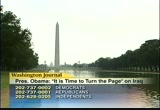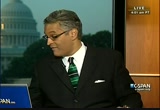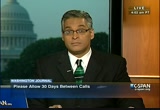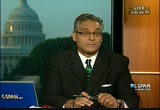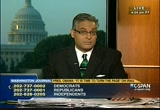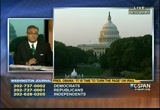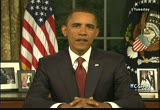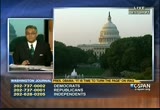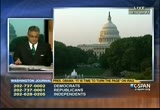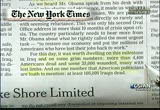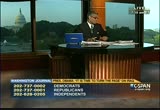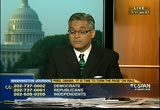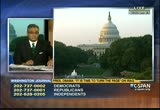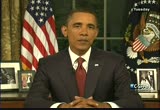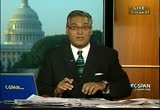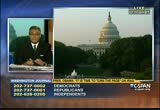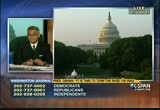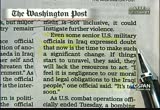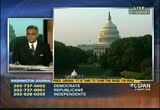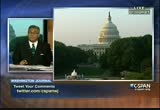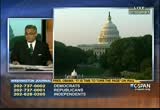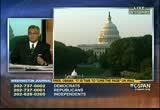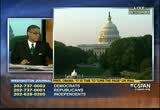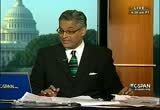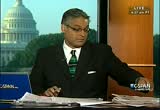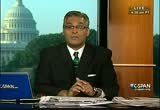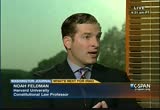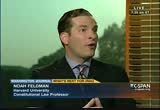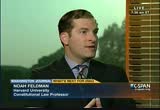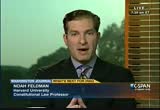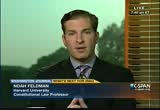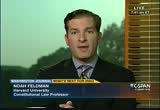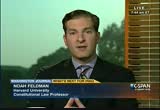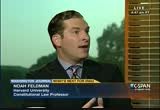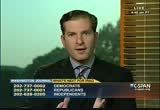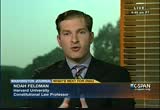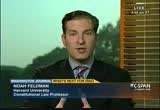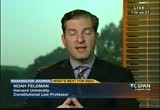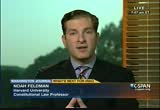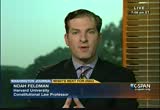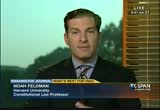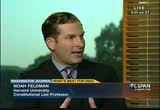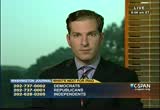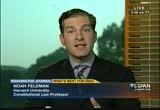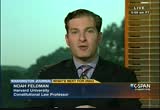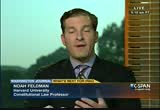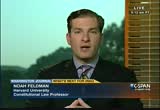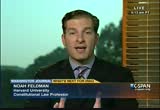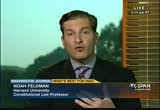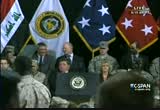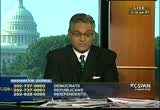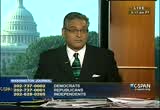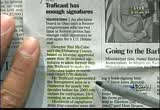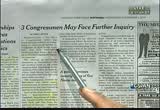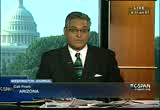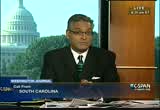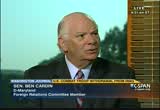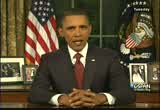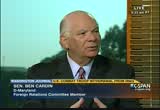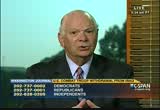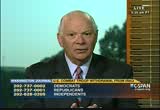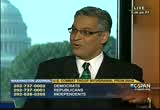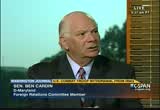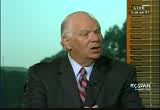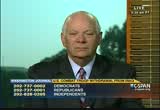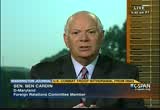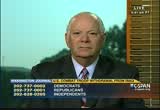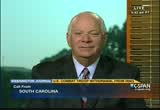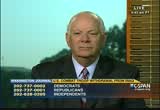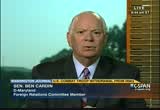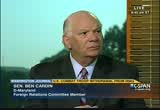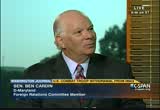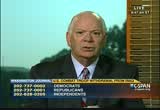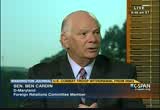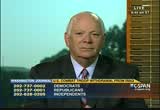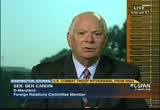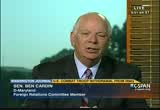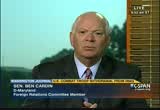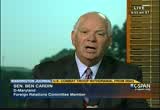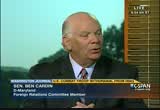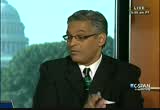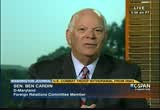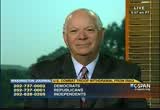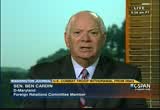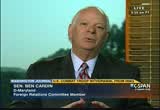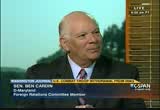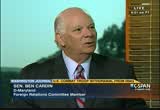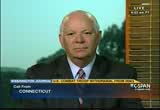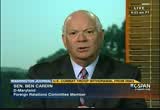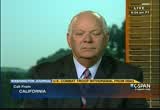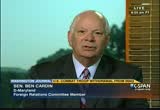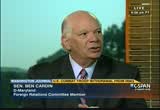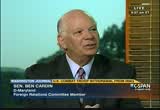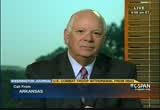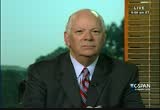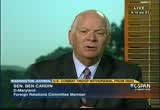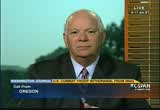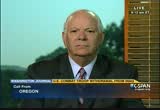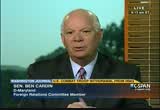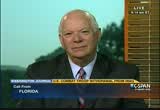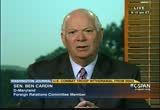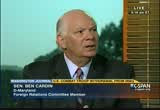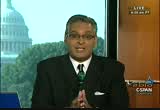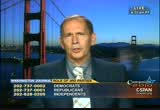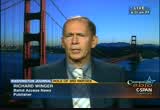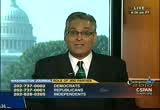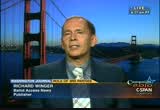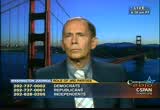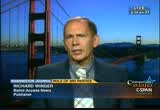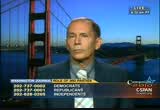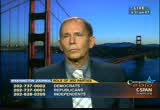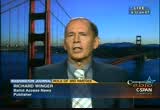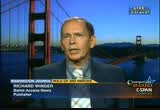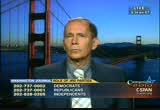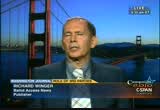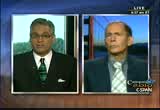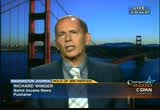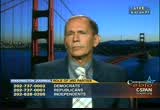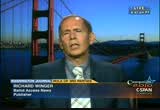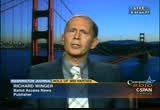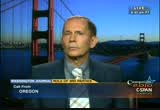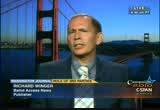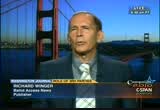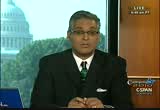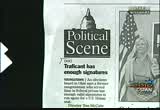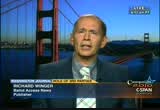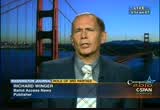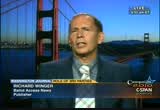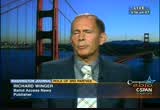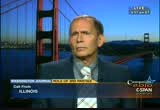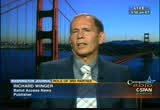tv Washington Journal CSPAN September 1, 2010 7:00am-10:00am EDT
7:00 am
7:01 am
thoughts on what means to you, in terms of remaining forces, the condition of the government, the current effort in afghanistan and condition of the u.s. economy, all referenced in the president's speech. here is how you can talk to us the first half hour. president obama saying last night it is time to turn the page. your interpretation of that. phone, e-mail, or twitter. again, if you want to give an e- mail, journal@c-span.org and twitter, go to twitter and then c-spanwj.
7:02 am
"the washington post" use is that " for its story tonight. turning to "the new york times." and going to "usa today" -- again, the president quote. conn. mary on hours democrats line. caller: good morning, pedro. i wanted to say how proud i am of president obama fulfilling another of his campaign commitments. i wish to the iraqi people well in governing themselves. and i agree with the president that it is time that we concentrates on our economy and
7:03 am
what happened to the people in the middle class. i hope he does stand strong on inundating -- eliminating the tax credit that was given to the very wealthy, by discontinuing that at the end of the year. host: raleigh, north carolina. john, republican line. caller: i was listening to what you were saying about the president's speech, turning the page. i happen to be thinking it is time to turn the page and to stop bashing bush. i was also reading "american thinker.com" this morning and saw how president obama authorized a submission by the state department to bed u.n. on human rights abuses by the u.s. and unfortunately i also saw where "washington journal" was
7:04 am
named the home of the anti- jewish man lunatic france because of the anti-semitic comments a lot of people have. i think if we can get past all of the rancor and also the problems with our people and just get along we can all work together and improve the united states. host: dallas, texas. dave on independent line. caller: it seems to me this whole iraq name was one of the most useful -- useless and few till. we were manipulated into this by the oil boys, the weapons industry, neocons who had their own reasons for doing this. i cannot see what we accomplished except -- we have our own financial destruction.
7:05 am
and then the tearing apart of our own social fabric. host: when the president talks about turning the page, what does it mean to you? caller: i wish it meant getting out completely but i don't think it does. we will probably head off into another self-destructive that direction. we don't seem to have any clear focus -- not only what is going on but what are part in all of this should be. we tend to use weapons before we use our brains. host: "the wall street journal" highlights the president's speech. they write that -- he gave short shrift to iraq as a democratic ally in the middle east and did not say when or even how our ultimate success in iraq had informed his own decision to surge troops in afghanistan. virginia, the plan, democrats line.
7:06 am
go ahead. caller: i am from new york. shall i speak up? host: go ahead. caller: i think he should turn the page. it should have been turned a long time ago. but i do not think the media will let him because they just keep the war is going. let me say this because i tried so hard to get on to you -- george washington's farewell address. he answered many of the questions facing us. telling us we should be aware -- host: sorry, we will have to let you go. your signal is breaking up. here's more from the president last night. >> we must use all elements of all power, including our diplomacy, economic strength, and the power of america as an
7:07 am
example to secure our interests and stand by our allies. and we must reject a vision of the future that is based not just on our fearless but also on our hopes. division that recognizes the real dangers that exist around the world but also the limitless possibilities of our time. today, old adversaries are at peace and emerging democracies are potential partners. new markets for our goods stretch from asia to the americas. a new push for peace in the middle east will begin here, tomorrow. billions of young people want to move beyond the shackles of poverty and conflict. as the leader of the free world, america will do more than just defeat on the battlefield those who offer hatred and destruction. we will also lead among those willing to work together to expand freedom and opportunity for all people. host: your thoughts on the
7:08 am
aftermath of iraq. fort myers, florida. john on our independent line. caller: i would like to say a couple of things about this turning the page. what is really interesting about a lot of people that are interested in turning the page are those that are not interested in seeing who actually started this war and to prosecute whoever got us into this false war. no one wants accountability. everyone wants to turn the page. you know how much money and lives west of the there for what? bush and cheney need to be locked up and they need to have their bank accounts and steve and somebody needs to hold them accountable. before we read the page first before we turn it and hold people accountable then we will have the same crap over and over again. wasteful elected officials. host: detroit, michigan.
7:09 am
the doors on our democrats line. caller: thank you for allowing my call. i just wanted to call and and say thank you president obama for taking our troops out. actually i watched them come out ahead of time before he gave his speech. i want to thank george bush, cheney, wolfowitz, for lying to this nation and bringing us into this crazy war over and iraq that we had no way of as they say winning cliche. but thank you president obama for keeping your promise to bring our troops home. these young men and women deserve nothing from the best from us and i agree with the young caller that called before, bush and cheney should be held for high crimes and misdemeanors for the dirt that they did during this perpetrating this illegal war. host: "the new york times," in their lead editorial, the war in
7:10 am
iraq. editors -- san diego, california. roseanne, democrats won. caller: i am really glad you mentioned the 100,000 number of iraqi dead. i am sure it is much more. i, call into say aye and kind of disappointed -- although i am not surprised -- that we never hear the running sewage that spills and the streets of iraq
7:11 am
-- i read that in "the new york times" and other places. we did not hear about the water. the people still being bombed. we never hear about what is happening in iraq today because what we america did. i was really disappointed but not surprised that obama and nobody in america's government ever tells us. nine or seven years later, are still suffering because of what we did and i did not think we should be saying that we won anything. we are still over there. people like still dying. there is still a chance for a civil war. and people are suffering. iraq used to be a technologically developed country. it is no longer. host: in light of all that and the president's speech about turning the page, how do you make his thoughts your thoughts this morning? caller: i did not think it is turning a page.
7:12 am
i think it is kind of walking away. i did not think we should have been here in the first place and i do not think we should still be fighting. we know iraq something. and the least we know -- we of them to acknowledge they are still suffering because of us. host: do you define it as walking away, using your words? caller: it is pretending it is over. turning the page is not quite the right word. we have something to amend. i do not know what we will do to amend for it because we never do. but i do not think it is the end of anything. it is not turning the page. it is turning the page for us and i hope for those people. i truly do. host: ann off of twitter -- philadelphia, pennsylvania. fans are waiting. oscar, democrats line.
7:13 am
caller: my name is oscar hilton. i am calling to keep the book open. the book should be open until we find out why we went there. 5000 people have been killed. i don't know how many have been wounded. it does not make any sense. host: when you say keep the book open, what do you mean by that? caller: to find out why we went to iraq. the real reason. not the bs reason they always come out with about weapons of mass destruction and other things that were really important. i do not think -- i think it is about israel, protecting israel from starting a war with iraq and iran. host: the president last night took time in a speech to reference the economic condition of our country. here is what he had to say. >> our most certain task is to restore the economy, put the millions of americans who have lost their jobs back to work. to strengthen the middle class,
7:14 am
we must give all our children the education they deserve and the workers the skills they need to compete in the global economy. we must jump start industries that create jobs and end our dependence on foreign oil, unleash the innovation that allows new products to roll off the assembly line and nurture ideas. this will be difficult. but in the days to come it must be our central mission as a people and my central responsibility as president. host: and "usa today" this morning, a headline -- iraq to spend $13 billion on u.s. arms, equipment. one of the world's biggest customers for american military arms and equipment.
7:15 am
illinois, thanks for waiting on the republican line. caller: i am glad to hear he's got the troops come back out, that is fine and everything. i kind of wish people would remember back when saddam hussein gas del of the kurds, then he invaded kuwait, and we told not to and yet he had still done it, one of the reasons why we went in there. we tried to liberate them people because he had them down
7:16 am
underneath his thumb. i just wish people would look back and remember all of those things. they all think, it is an illegal war, we got in there for no reason. no, we had a real good reason at the time. people just don't remember. host: the president laid out his goals for the future of our relationship with iraq. what do you think of them as far as turning the page, as he spoke about last night? caller: i think that is great. it would be nice if we can get the country stabilized and they have their own government. i hope basically we will get all of our troops out of there. but right now, things are becoming stable over there and we need to have some friends in that part of the world. if we don't have friends in that part of the world eventually when we need oil or their help, we are not going to have it.
7:17 am
host: massachusetts. good morning. caller: god bless, america. welcome home all the men and women who fight in iraq. and when you talk about turning the page -- how are we going to turn the page. 5000 people -- over 1 million iraqi people died over there and nobody say anything. i hope this never happened again because we can go all low one of the world -- say you should do this way and you should do the other way. we have to think 1 million times before we start another war someplace out. america is a beautiful country. of the politicians as the problems. look at mr. mccain, spending $20
7:18 am
7:19 am
are you? good morning? i would like to make comments about obama's statements when he said that we americans who are doing a great job in order to fight the hatred. i think the word hatred should be very carefully analyzed. because in my opinion, going to war and now bringing the troops home will not stop violence in iraq, in the u.s.a., or anyplace else. for me, the word hatred, it appears to me that the issue of war is not a cause to promote the israelis, as i see the headlines and the way the politicians play here in the capital. i agree to one of the viewers who say america is a beautiful country, beautiful land. and i think one problem here is
7:20 am
the politicians and of course i include the courts. i think the courts -- should call the attention to the president for total reform. host: off of twiiter this morning -- we will talk about some of the institutions and about 15 minutes, specifically the iraqi government. he may remember the name, as a helped draft the iraqi constitution. he will be here to talk about the condition of the government and what goes ahead as the government establishes itself. "usa today, what their editorial page. -- "usa today," their editorial page --
7:21 am
las vegas, nevada. republican minority caller: thank you for taking my call. thank god for c-span. i do think we need to turn the page but the page needs to be turned in our country. i work in the construction industry and a lot of times when i work with minorities they are always saying americans deserve what we get, we deserve to lose, it is all about oil. and unfortunately, that sentiment has echoed from a president who apologizes for our country, instead of saying like a shining beacon -- began on the hill like reagan's -- reagan said. host: did you watch the president's speech last night because he did talk about the economy? caller: yes, i did. he says a lot of things but he
7:22 am
also exudes this attitude of apologizing, of letting the people of the world know that we have done that things in this world. we have done some things where we do have, black eyes, treatment of the native indians and blacks, but we cannot go on apologizing. if we are a country of great honor and it is not all about oil, it is about trying to set a firm example of what freedom is and what it means to all of these people in the world. host: minnesota. independent line. caller: i don't agree with a lot of the stuff being said about everything that is going on. i like the fact that people are praising obama because he is keeping his word and i do agree with that, i like him for that.
7:23 am
host: when he says it is time to turn the page, what does it mean? caller: it is really not turning the pages. going to the next chapter, that is it. it is what it is. host: and arbor, michigan. david on the democrats' line. caller: thank you for c-span2 and i would like to thank george bush for the iraqis who had to flee the country. for the 3 million ethnically cleansed. the million or so that are dead. are you there? host: i am listening. go ahead. caller: and for the couple trillion dollars that we wasted. and to say that we did this with honor is kind of silly. this man sent a christian army
7:24 am
into the muslim world with no allies, especially muslim allies to avenge -- host: are you there? by the way, 8:00 this morning there will be a change of command ceremony and operation in bonn that the present spoke about last night. the speaker will include the vice-president of the united states, joe biden, and you can see it live on c-span2. harrisburg, pennsylvania. tom, republican mike. caller: i am calling to say that it does not seem like we are turning the page at all. it seems similar to what george bush had said toward the end of his presidency. host: go ahead. caller: what bothers me, we talk about turning the page in iraq. i would like to see the rest of the world begin to turn the page. you look at the missionaries who go to afghanistan and iraq and are killed by muslim extremists, with no military objectives at
7:25 am
all, only to go -- do good, i would like to see some of these people talk about turning the page to protect our own american citizens. host: baltimore, maryland. david, independent line. caller: thank you for having me. i love c-span's coverage. you get to listen and talk to many people you would not able to get through to many -- regular media. i saw the speech. i actually thought it was pretty good. my only concern is the iraqi people. once we are totally gone, we need to help them out with infrastructure an institution building, especially the younger people, we build schools and hospitals, how much better it
7:26 am
will make their lives. it is still spotty at best. i just hope they follow up with both iraq and afghanistan as far as institutions, and everyday amenities we enjoy here in america. host: washington, d.c., dan on our republican line. caller: pedro, thank you for this show today. regarding your question, i am not sure we should turn the page, even though today is operation red dawn. i think we should stop and reflect where we have been the last several years. i have been on the streets of baghdad. i have been to of the grid, i've heard the stories of suppression under saddam hussein and the party -- women being raped, children tossed
7:27 am
into mass graves. and we should think of the men and women who gave their lives, the blood, sweat, and tears, and a service members who paid the supreme price to set a country free and help them have a feature and a hope. it was not just one person's decision. i think at the time it was our country's decision. it was our conversive decision and it was the american people's decision. we all need to own the decision that was made. thank you very much. host: a story in the papers about alaska senator lisa murkowski conceding in her race against joe miller for the republican primary. looking at the results, 100% of precincts, mr. miller with just over 50% and the senator with just over 49%. florida, jeff, republican mike. how are we doing today? caller: i think we should take
7:28 am
troops out of iraq and put them to afghanistan. let them bring their noses back off of the ground and see what they do. come back and finish the job and then we can come back over to afghanistan and do what we needed to to clean that up and we can get out of there. until something happens with israel. host: alcott city, maryland. good morning. -- ellicott city. caller: i would like to say when you had in africa hutu and tutsi's the leaders prosecuted for war crimes. george bush brought blackwater in iraq and they planted hundreds of thousands of bombs in markets and mosques to divide the iraqis and have iraq divided into three countries. they terrorize the whole country. every bomb that went off was not
7:29 am
a suicide attack, it was a black water attack and i think george bush should be prosecuted for this, and and all of the neocons who are only working on behalf of israel. host: we will continue this discussion on iraq, especially the future of this government. our guest is noah feldman of harvard university, the person who at least helped draft the iraqi constitution. he will talk about the condition of iraq's government and its future, when we come back. >> search of the term mideast peace online at the c-span video library and you will get more than 1700 programs and more
7:30 am
than 8000 transcripts, including an early mike wallace interview , interviews, panels, and forums all free online. it is washington and the world, your way. "book tv close " primetime continues tonight with a look a social network. david kirkpatrick on the creation, growth, influence of facebook. and documenting the rise of myspace and the battle between rupert murdoch -- rupert murdoch and redstone to own it. the cult of amateur author, the value of digital media by the people. and media giant google. "book tv" prime-time tonight on c-span2. c-span provides coverage to politics, public affairs, nonfiction books and american history. it is all available on television, radio, on line and on social media networking
7:31 am
sites. find our content any time through c-span video library. and we take c-span on the road with our digital bus, local content me a call, bringing our resources to your community. washington your way. now available and more than 100 million homes. it created by cable and provided as a public service. >> "washington journal" continues. host: noah feldman, how much onus did the president put on a rack's government for its future? guest: there is a tremendous weight already. if they did not form a government soon, it will lead iraqis to have the general feeling that the future is not going to be organized or ordered. and fear of collapse of order is what will drive people back to the militias, where they were three or four years ago. so, the government realizes this and are trying to play a complicated game where each of the political parties want to gain advantage without completely alienating the general public.
7:32 am
and there is a time limit. he was reminding them of something at a fundamental level they understand. host: how would you rate the government's performance today on big issues? guest: there is no government right now. i would rate the politicians performance pretty low given that the elections were in march and is now the end of august. actually, september. they still have not managed to overcome their differences, which are both political and also the nomination of insectarium, to form a government. so they need to get their act together and do that. to the ordinary, everyday services, i would say security in iraq is substantially better than at previous times but still not all the way there. we know that from recent attacks that's certainly are not a coincidence, just at the time when the u.s. announced it was withdrawn combat troops. host: what did they have to do to push themselves from where they are now to where they need to be? guest: they need to make deals. the two leading vote-getter in the elections in march were a
7:33 am
party that was mostly supported by sunni iraqis, although the leader, awlawi, mostly sunni and other was s other washia party that split from the more religious. it look like they are not able to form a deal with each other. it seems like the division is so fundamental that they are refusing to do a deal. that means what is needed is for one of the two to make common cause with the kurdish political parties and probably the more religious shia parties. the more likely scenario is the portia party of all molly k., the president, -- shia party of al-mailiki, the president. concessions are the name of the game in consensus politics. host: what kind of chips they have to put on the table? guest: chips that not only they
7:34 am
don't want of the united states, either. religious shia part is one greater influence of religion, were religious leaders and important -- positions in the government and the port -- courts, and the kurds always wanted the same thing. they won greater and greater autonomy in their part of the country. it is partly a matter of pride and language but also a matter of oil. they have proven oil reserves and a suspect that have more and what a greater percentage of the revenues to come into the country. that is the price they are placing on their continued participation. host: here is your chance to talk with noah feldman today. when you helped craft the iraqi
7:35 am
constitution, tell me a little bit what you did back then and what is playing out in the day by day effort? guest: the role i was lucky enough to play was a period before and during the draft, the transitional law, which essentially was the draft constitution. operator for a year before the constitution was ratified and is quite similar. what i was lucky enough to see is iraqis who got involved in politics came to realize pretty quickly that they were not going to have any kind of agreement unless they made substantial concessions, which means people of secular orientation had to agree with islam played a major role and religious folks had to agree the constitution would include a promise that the state would be both democratic and islamic at the same time, which is very innovative feature and an important one because it meant a concession by all iraqis any signal to everyone in the world that democracy and islam were in fact compatible, which now i think we don't doubt but many doubt it is significantly when the draft was going on. and the kurds had to can see
7:36 am
they were not going to have their own country. arab speaking iraqis had to acknowledge that the kurds had been mistreated in the past, they were a distinct group of people, and they would have some degree of autonomy. each and every one of the concessions was agonizing. painful to make. the last thing -- and this is something i think profoundly true of all constitutional drafting -- the issues that were the hardest to resolve, kirkuk, for example, ethnic caught dead with a lot of oil, terrible combination, or the deepest cut deductions between democratic value is an islamic, they were planted, pushed down the road. a lot of constitutions do that. the u.s. constitution punted on the fundamental issue of slavery, allowing it to remain in place, thinking the slave trade with and in some period in the indefinite future but not ending it at the time. these kinds of contradictions
7:37 am
can lead to trouble down the road. but if you don't make these concessions, you do not get the constitution. that is the trade-off of constitution writing and you might say the dirty secret. the hard issues are often not resolved and in the case of the united states, mean to the civil war. h., -- host: you wrote about south korea. u.s. military troops being there. is the military going to be an important part of 50 iraqi government operates well? guest: in the short term, yes. but our agreement with the iraqis until the end of next year we still have troops and the numbers and specific but 50,000 are there right now, a substantial deployment. in the next year you might see and i think are likely to see an elective in nine -- iraqi government asking the united states to renegotiate and leave a significant number behind after the deadline for complete withdrawal. that will be a tricky political judgment but probably would agree, as long as violence is not too significant in iraq,
7:38 am
because our presence gives everyone a kind of assurance or a backstop guarantee that we would not allow the country to collapse back into the civil war. in south korea, 1953, when the armistice happened, that is 57 years ago and we still have close to 30,000 troops in korea, and furthermore, there were 35 years of military dictatorship which we supported and then eventually south korea and merged into a democracy. that is a very long period of time and it means a lot of patience and a lot of resources. as long as u.s. troops are not actually killed, the american public in general has been willing to stand for it. and i suspect it will be true going forward as well, if american troops are in harm's way we will probably have lots of people say take them out, but if they are safe and are contributing to a record stability i think it is probable that the american public would be willing to stand for that, but who knows, i am not a
7:39 am
prohphet. host: noah feldman is here to talk about the future of iraqi government. you are on the line. go ahead. linda, are you there? caller: yes, i am. host: go ahead. caller: thank you. i would like to know why is it that we keep pretending that these wars -- i am talking, can you hear me? host: you are hearing the feedback from the television. caller: why is it we are pretending that these wars are not causing up all of our financial problems? we have lack of employment, people dying because they cannot get health care insurance but yet we keep catering and helping people in other countries like haiti and iraq, what is the difference if you die from an earthquake or the taliban or
7:40 am
just not getting medical treatment over here? guest: i think you are right, linda, we have serious economic problems in our country that we are grappling with and we have under insured people and other very serious issues in the country. i don't think that most economists believe that the war caused the financial debacle as we experience. everyone agrees that the war has been extremely expensive, but the iraq and afghanistan wars. and the money we have spent on them is money that we don't have, it is true. that is a note of the president sounded to some degree in his speech last night when he said specifically we need to turn back to the economy. that said, we also do have ethical obligations of around the world the same way we have certain ethical obligations at home. we certainly have a duty to our citizens to provide health care, in my view, and certainly to help people get back to work but in the case of iraq, the iraqis
7:41 am
ourselves the not asked us to invade their country and the do not ask for the civil war that followed. and one of the reasons that we required such a need to put money, time, and also american lives, almost 4500 had been lost in iraq, is that we created that situation and we have an ethical response ability to bring it to at least some sort of function in conclusion. iraqis have responsibility, too. we are not the only ones. but i think it is significant we have a duty to people. host: from twitter -- i guess he is making the observation they are learning the same lesson. guest: no question that anyone who thinks it is easy to write a constitution is quickly disabused from that notion. the bottom line is getting people to agree when you have different interests is very hard and in the u.s. case, we had
7:42 am
small states with different interests, northern and southern states, creditors and debtors who have different economic interests. the people in iraq have all the sets of issues and on top of that they have denominational differences and ethnic differences. these are significant long-term problems. again, the key to iraq working its trouble out is security. security has improved a lot of the still very far from being all the way there and probably why u.s. troops continue to play an important role. host: arlington, virginia. you are next. republican line. caller: in regards to the democratic transition of iraq. analysis in that region and pretty much around the world, went to callahan governments make the initial transition from being a -- when totalitarian
7:43 am
governments make the transition to other types of role, a democratic state, pretty much initially the state starts off as a weak democracy, a weak state, pretty much transitioning as they adopt more of their ethnic and cultural the values in their constitution. part of my question is, with regard to the development of the iraqi constitution -- host: we lost him. guest: we lost him, but if i could pick up on what he was saying, i think you are right to say that it takes time in the process of democratic development for governments to take on board itself the practices of democracy and for the public to incorporate democracy into their own set of cultural values. iraq is certainly in that
7:44 am
prospect. one day i saw the -- in iraq that i thought was pretty remarkable is the basic idea of democracy, the basic idea of elections and fundamental rights is surprisingly intuitive throughout the world. it is not as though the first days the iraqis say, how do we do a democracy? people had no trouble having elections at the local level and ultimately of the natural -- national level that were successful. the difficulty in developing institutions is both functions work and both respect and the credit now use. the iraqis had some functioning institutions but they were totalitarian. during both -- extremely difficult. it is important for ordinary people to take on the values and ideas of democracy but they will only do that if they see a government that deliver services for them. otherwise they say, what is democracy? a recipe for us fighting. i pick many iraqis have the
7:45 am
suspicion over the last couple years because the institutions of the state have not function. it is worth remembering that we really destroyed the infrastructure of the iraqi state. it was not a great infrastructure to begin with. under saddam hussein, many things that looked under the surface as a real institutions actually were not. but we did physically bomb institutions and stood by and allowed the looting of government ministries. one of the important effects of the setup failures on our part as occupies is the institutions of the state were really gone to a great extent when i -- i division began and remains gone when the occupation ended and a lot of the work in the last several years was trying to rebuild them. host: what is the perception of the people about a future of the government? how important is it for a government to function? guest: puget in for and for the government that ordinary iraqis believe -- it is hugely important for the government that ordinary iraqis believe it. i think the bottom line is that most iraqis seem to believe that
7:46 am
there can be a functioning iraqi government but they are kind of pessimistic about how good the government will be paired they are realists, that is a good thing. they should not have idealized expectations. but to the extent they are skeptical about basic services, that is undercutting. it needs people protest patient. in a democracy you cannot rule by gunpoint. the have to do more than just a vote but they have to participate. they have to not go to the electrical plant and blow it up or tried to steal electricity. they have to be willing to pay taxes. >host: what is the importance of prime minister nouri al-maliki? guest: he played a significant role in recent years. when his prime ministership looked week he took aggressive action to associate himself with security forces and helped put down the shia militias. that was a great move. it was very risky but it turned
7:47 am
out pretty well because it did not only strengthen him as prime minister but strengthened the perception that the government could create law and order, that the government can say to militias, we do not care if we share denominational background, we will not let you run the show. there have been allegations of corruption connected to his government. if you compare it to afghanistan, the record does not look that bad. iraq has suffered from insignificant -- significant correction but he himself has not been impugned the same way that i need karzai -- hamid karzai has done. what he has not done as well reaching out across denominational lines, especially to sunnis. use all that in the elections when most sunn is voted for a different party that actually got a slight majority -- not a total one. i think there is probably his
7:48 am
weakest point. host: it seems like adherence to the nomination and religion -- guest: it is something that has to be caught and over. absolutely right. if the sunnis voted for a shia, that was a significant fact. he was someone they could do business with but the fact remains his support was not framed in denominational -- it is a nondenominational party. in a perfect world it would be nice to see that party and the other big vote-getting party working together. when it comes to their actual policies, like on the kurds or the more extreme requests of religious parties they are relatively close together. the fact they have not managed to come together despite being closer on policy issues is beside the nomination still remains a significant issue. host: noah feldman,
7:49 am
constitutional law professor. caller: we should not have gone to iraq and then you would not worry about -- you would not have to worry about how to get that country back together. we've got problems in the united states. terrorism starts at home and not another countries. you going over there trying to the world powers but you should not go over there in the first place. host: you could comment, if you wish. guest: i guess i would say that in foreign policy at least, you cannot have any choice, you inherit the world the way it actually is. we did go into iraq and we did it defeat saddam hussein, which had the benefit of removing someone who was a terrible dictator, not just garden variety but someone with the genocidal impulses to kill hundreds of thousands of his own citizens. we also got ourselves involved in a situation where we did not
7:50 am
have enough troops to stop the country going into civil war. we lost a lot of our own troops lives. a lot of iraqis have died. now that that situation we find a cells, we did not have much choice but to stabilize the situation further and try to create the best possible outcome for iraqis. that is the way the real world is. webbings have been a certain way we have to deal with consequences. especially when we as a country are directly responsible for that. i think as americans we are all responsible and the same way our troops come from all political parties and backgrounds, even if they opposed the war. we as citizens, including people who opposed the war at every stage, like the president, i should add, still have a duty and responsibility and that is why it is nice to say the -- hear the president say week, when we talk about the involvement, all of our country and responsibility. host: this is off of twitter.
7:51 am
guest: it is a tricky question what people want when it comes to democracy. when people, for example, were caught elections, which happens boycottedhe sudannnis -- you could deduce that they would rather have no government or a bad government. that has changed when they came to see that elections are part of the political game. not all of the political game. there is still violence, which is unfortunate. the fact that iraq is voted across back room, across party and the nomination does suggest iraqis understand that they have a democratic government. will there be some iraqis still yearning for a strong man -- straw man? yes. if a functioning government that respects rates emerges, the long term possibility will be high
7:52 am
dictator merging. there will probably be some iraqis who agree that a democratic government is not desirable but the vast majority seem pretty committed to a democratic government, if it can work. host: is there a feeling among the people and the government even in the u.s. that it will take time to make this government function and how much time to a lot to that process? guest: one of the strains distortions in iraq and politics for the period of first illegal occupation and then are defacto occupation afterwards is iraqis got used to americans coming and setting deadlines, sang this has to happen by this. but often ignored the american deadlines. but shaped the rhythms. unfortunately it still does. the fact that our president in a speech to our nation is saying to the iraqis in politics, ok, let's go, formed your government, it tells you about the development of iraqi politics. not developed to a point internal dynamics of driving things. that is one of the distortions
7:53 am
of living under occupation. that has to change. i think ordinary iraqis are a little skeptical about when it will change. my sense is it will change when the iraqis actually realize they are truly on their own. they are not quite there. removing combat troops does not put them on their own. host: did they know that message -- some time going in when the whole process started? guest: at the very, very beginning after the occupation of the iraqis were just confused. they did not know if we were staying permanently, for the short-term, and that confusion actually led in part to the emergence of a civil war because the thought of themselves, well, the u.s. is not in charge and we are not in charge so nobody is in charge. when you are in a situation when nobody is in charge it is like living in a bad neighborhood where the gangs come by and say can you join a, you did not want to, then the gang says the police are not going to protect you and at a certain point of view to not join the game, the gang, you are a sucker.
7:54 am
ordinary people had to go to militias because there was no state. so the problem -- putting a government in, showing we were in charge. we were in charge of the violence began to reduce and iraq is look more. the government but they still have not fully taken on board whether the government will succeed because they are realists and in other governments still might not succeed so i think the iraqis are making a probabilistic -- it looks probable the government will make it so they are not supporting militias but there is still a chance that it will not and that is why our continued presence is is some value, to suggest that we will not let it fall apart. it helps people not go to the militias. the bad side is a undercut the sense of responsibility they have and they can say, well, so what. let us just wait it out and see when we can get an advantage. host: what is the realistic expectation as they look at security and police forces to help them information of the government? guest: the police force and military cannot help in a direct
7:55 am
way unless you are truly in a military dictatorship situation, you need to have civilian control of the military and that is usually import for their future. what they can do is establish enough on the ground and security. because terrorist attacks are designed in iraq always to deepen the tensions between the different groups and the society and also to create the impression that the government is not in control of that is why the recent attacks we saw or heavily against police stations and army recruiting centers. the terrorists in iraq understand perfectly well that the police and army are there to enable security which will let the government function and flourish. so their goal is to undercut that process. host: annapolis, maryland. rose, independent line. caller: probably made the world and little less safe than it was before under saddam hussein. and the other, that i have is america will probably be in iraq for the next 50 to 100 years,
7:56 am
just with the military presence. what is disturbing to me about this is back america today has military bases in roughly 100 countries already and i am really wondering how much that is actually contributing to the rest of the world looking at america as not being such a good neighbor in a way because, you know, if china or russia were starting to expand their military presence to 50 to 100 countries, i would probably be quite alarmed and the other point i would like to make is that it is all a matter of can you afford it. america is in essentially bankrupt and we are involved in these wars that we can't pay for and this will all come back and haunt us down the road. when they talk about america's interest, what is a merkel's interest?
7:57 am
president obama talked about that. is it that we are out there to get the oil from the middle east? while we are in afghanistan because they have all of these tremendous resources sitting in the ground? is that what we are doing? guest: great questions. i counted at least four of them and i hit on all of them. are we safer or less safe as a result of our invasion of iraq and the failures of our occupation and now the drawdown? it is a very difficult question to answer definitively. iraqis themselves in the bad times recently did not feel especially safe. that said, saddam hussein myself killed hundreds of thousands of iraqis. it is of a tossup. if you live in a police state, if you oppose the state the state will come and kill you. it in the state falling into civil war, anybody could kill you. in that situation many iraqis were in during the period in which the civil war was brewing. now things are substantially better. there was a level of violence in
7:58 am
my view still not tolerable. regionally the united states did not substantially strengthen its role but i also did not think we are substantially weaker regionally. it is very difficult question. in terms of our presence in iraq and elsewhere in the world. when american troops are present to add a securities it was in the resentment is different than if we are appearing to be suppressing the population of supporting an illegitimate government. i think south korea is not a bad example of that. when the united states was supporting military dictatorships in south korea, some koreans who opposed the military government strongly objected. now that south korea is a functioning democracy, the population is more deeply divided. many people would like to see the united states leave because they are very proud and have strong national pride and do not want to have a sense of the united states is in the country but then they understand what korea remains a risk and for
7:59 am
that reason there are some south koreans like the idea of u.s. troops remaining. that imbalance, which is a very complex one, will be true in other countries as well as well as iraq, long run if we are successful in leading troops behind there. last, but not least, on the question of our interest. the united states is not so different from other countries when it comes to foreign policy. we like to think that we are unique and would like to care most about moral responsibilities are doing the right thing, foreign policy idealism. we are not all like that, we are also realistic. we think about our national interests. and our involvement in the middle is broadly reflects both. often at the same time and sometimes in contradiction. actual foreign policy interest in stability. we would like the region to be stable partly because we have potential for real global pilots in the region, with israel, iran, other countries potentially at odds. we also have a realist --
8:00 am
realistic interest in stability because we do have oil interests. we are also a country with values and ideals and i think in iraq the central idea is we have of responsibility to try -- not necessarily to succeed -- to try to provide iraqis a roughly functioning government of their own and i think we are making some guarded progress in that direction. host: boston, massachusetts. charlie, go ahead. caller: i read a couple of days ago story in "the new york times," pretty sad about identifying the dead in baghdad. a really morbid story. .
8:02 am
stability. guest: you said, why don't the sunni king comes of the region, like saudi arabia, come in and explain to iraqi citizens that in a democracy they have to allow the majority to govern. the answer is they're not democracies themselves and they were very apple biff lent about seeing a country in which sunnis controlled the country under saddam and had control of the country even before saddam despite not being a majority suddenly finding themselves in a democratic situation. there was really -- there was real ambenevolence and you pretend you're a kingdom and not a democracy, a successful democracy next door sends a message to arabic speaking people throughout the world that they can have a functioning democracy throughout the world. i think that was one major
8:03 am
reason. the other reason is as shiia-sunni tensions grew in iraq, which is why we were not providing sufficient security, all over the middle east the issue of iraq became in part not holy but a sunni and shiia issues with she eye iran very actively -- shiia iran very actively involved and shiia supporting sunnis in the insurgency. as that happened people in the region began to line up on those denominational lines rather than lining up in terms of -- what ordinarily had been national interest. i think, i think that we're helping -- we've helped a little bit in that direction and the sunni-shiia tensions were less than they were years ago. host: there is a transfer of power ceremony which was set to begin at 8:00. those will take place momentarily. the vice president is set to appear at those functions as
8:04 am
well. what's the importance of this ceremony? what does it do as far as painting the picture of the future of iraq? guest: the ceremonies that we held in iraq have been reducing significance over time, i would say. -- saddam is actually gone. then there was the ceremony where we transferred sovereignty after a year of occupation. that was significant because we remained de facto the occupiers of the country. this i think is some ways less significant. we are saying it's the end of our combat operations phase, but we still have 50,000 troops in a country and the president was pretty equivocal about this. he says now iraqis will take the lead. didn't say we weren't going to be continuing defense of the country. it's important that we do so. i think a ceremony which amounts to the changing of the name of the operation smot a ceremony that will have deep
8:05 am
resonance for ordinary iraqis or i think for most americans. very careful not to say mission accomplished because we said that much too soon the last time because the mission is not accomplished in iraq yet. host: this email, mr. feldman, does the united states really have a clear understanding on the issues in the middle east? how do we end our involvement there without making matters worse or getting blamed for the failure of those differences being resolved? guest: great question. our understanding as a question of the middle east and also in our government has improved enormously since 2003 when the united states invaded iraq in the first place. we knew suppressingly little and the number of arabic speakers in the government, both deployed in the middle east and working in the government on the domestic side, was not many. nothing like it should have been. frankly, ordinary americans didn't know the difference between sunnis and shias. according to a famous story when he was in the oval office
8:06 am
with president bush in 2003 president bush needed the difference between sunnis and shias explained to him. everyone understands such differences and that's an improvement in our knowledge. that said, we can still be blamed for difficulties in nonrevolution in the middle east in a range of ways because we remain an important regional player. because we still have troops on the ground, because we have allies in the region, both in israel and also in iraq. iraq is also one of our allies and our closest ally in some senses. so one consequence of that is we will bear some responsibility and often take blame, including for things that are not our responsibility. that's one cost of intervening in the world affairs. there are consequences and one consequence when people blame when things will go wrong. sometimes they'll overstate the case. host: kingman, arizona, you are next, dede, republican line.
8:07 am
caller: oh, yes, i want to ask mr. feldman about constitutional question, i guess. everyone calls in and says when george bush attacked iraq it was not constitutional. and i'm going to give me two scenarios and you answer which one is, was or wasn't. when bill clinton at the end of his term went into iraq and bombed for five days, i think they called it desert fox, said on tv that the reason he did was intelligence convinced him that saddam was planning to go to invade kuwait again after h.w. bush, you know, ran them out. but he didn't tell anyone because he wanted it to be a complete surprise, and he and
8:08 am
his staff felt it was necessary so they sent planes over, bombed iraq for five days and the only thing they did was knock out, i think, a pharmaceutical company. but he didn't have a vote, he didn't even inform congress when he did that. now, i don't know if that's more constitutional than what george bush did when he spent nine months explaining the reason he had to go back -- had to go into iraq and planning -- nine months planning the attack. host: we'll leave it there. guest: well, to offer clarification. most of the legal decision to invade iraq wasn't focused on the constitutionality because president bush did go to congress and get formal authorization to go to war in iraq. congress authorized the intervention. most typically, from the standpoint of international law and the argument has been that the united states didn't have
8:09 am
authorization from the united nations security council, which is as a matter of international law, supposed to be the final ash tore of international law before we invaded. now the position that the united states takes and still takes -- took and still takes, we were authorized to invade iraq by earlier u.n. security council resolution that essentially said that saddam had to follow the directives of the security council and if he didn't there would be consequences. so the united states said, well, these are the consequences. you haven't followed, saddam, the orders. many people in the other countries in the world who objected to our invasion said, well, that's not authorization. real authorization would require a new resolution from the security council. so the debate about the legality of the matter of international law of the iraq war has turned basically on that question. and when president clinton bombed iraq in operation desert fox he, too, claimed that the consequences offered by the
8:10 am
u.n. security council resolutions were justification. and i would add that when president clinton through nato bombed kosovo, that was another incidence where international critics of the united states said you haven't been authorized by the united nations security council to do this. and, again, the united states said, oh, yes we were. we insisted we were even though most countries in the world thought we weren't because we hadn't gotten a separate authorization. only both democratic and republican sides our chosen a different interpretation of security council resolutions. host: petersburg, illinois, thanks for waiting. larry, independent line. caller: yeah, good morning. my question deals with the constitutional issue also. we went in, shouldn't we be following the constitution and not the international implications on these issues?
8:11 am
and could you talk a little bit about the statements had a our father -- the things that our founding fathers were concerned about with us being involved in foreign entanglement? guest: great question. thank you for asking them. the first one has to deal with our constitution and international law and that's a deep-end hard question. i'll give you the 30-second version. if our founding fathers saw us today, i think they would say something like the following -- your first obligation is to follow our own constitution. that goes without saying. the united states government can't act outside the bounds of what our constitution allows. but the founding fathers also believed that the united states had to follow international law and ought to follow international law and they wrote that in the constitution in a range of different ways including in a clause that says the treaties that we make, which are part international law, are in fact part of the law of the land. and some people believe that our constitution through, for
8:12 am
example, the declaration of war provision, actually incorporates some of the principles of international law and requires us to follow international law. others disagree very strongly and say if the united states wants to break international law we're authorized to do that under our constitution the same way any other country can break international law if it wants to provided its willing to pay the consequences. so that remains a deep divide. i think all americans agrees that the first obligation is to follow our constitution. with respect to foreign entanglement, it's true that president washington in his farewell address warned against foreign entanglements and he wants a lot of trade with the world and as little political or military involvement as possible. he was a president of a republic which spans just part of the east coast. you know, from its tip to its bottom it was shorter than the range of i-95 and wasn't a global superpower. over the next 200 years gradual lieu the united states became a global superpower and that's
8:13 am
changed our perspective on our involvement in the world. as a consequence, especially after the fall of the soviet union, the united states has played a role in the world, sometimes positive, sometimes not so positive, of trying to establish and maintain a relatively effective and relatively peaceful situation. if we didn't do that to the same extent, how stable would the world will be? that's something that no one can answer definitively. we have to ask ourself a question, we have to be realistic about the answers. host: jeff, good morning, our on democratic line. caller: hello. you were talking earlier about these two factions are having trouble setting up a government. doesn't this really serve as a good takeaway for the american people to see how important it actually is to have separation of church and state? i mean, if your politics are based on your religion and you want to stay true to your
8:14 am
religion, that leaves you no room to compromise. i'd like your thoughts on that. >> you know, when you have -- guest: you know, when you have a country like our country has been at the beginning, but we were lots of different kinds of protestants with catholics and jews, it's good to separate church and state. it doesn't mean you have to do that, though. it doesn't mean that's a fundamental human right to separate government and church. iraq is overwhelmingly muslim. almost all iraqis on both sides agreed in a the constitutional drafting there that islam should be the official religion of the state. so the challenge for iraqis is to compromise within the framework of your religion. i'd say there are deep divisions in the country now but they are not about theology. they are not about the substance of religious beliefs. they are nor about denominational issues with the
8:15 am
sense of which team are you on? and as we go toward the re-establishment of securities, the more those denominational differences will be reduced over time. i hope, i hope that in iraq the choice of iraqis to have an official state religion will not ultimately stand in the way of their success. but, of course, i agree with the caller that in the united states where we have great religious diversity, keeping religion and politics separate to some extent is very, very valuable, provided that people can draw on their reous values themselves. host: thanks for your time and input. guest: thanks for having me. host: the transfer of ceremony taking place, let's listen to a little bit of it. our guest has to leave us. we'll take a few seconds to leave on it. we'll look at some articles as well. >> implementing and evolving roles in mutual support. we remember before you all
8:16 am
those who have fallen as a result of this conflict. u.s. and coalition forces, all iraqi military and police and all innocent civilians, let us remembrance of these motivate us to work more diligently to see a true sunrise of hope for this country. amen. >> ladies and gentlemen, please be seated. host: again, that's the transfer of power ceremony. we're going to continue on your calls for iraq. our guest had to leave us but we'll continue on. some other articles as well. 202-737-0001 for republicans. 202-737-0002 for democrats. 202-628-0205 for independents. fort lauderdale, florida, david on our independent line. good morning. caller: good morning. host: go ahead, sir. caller: oh, i'm sorry.
8:17 am
i'm not on the tv that i'm watching. i was -- i wanted to comment about the situation in iraq. host: uh-huh. caller: i strongly -- i was a loyal democrat and an ardent clinton supporter and volunteer and have been a lifelong democrat until the election when i became an independent. the current administration's foreign policy is an abomination of the basic fundamental philosophy that this nation was based upon. there is no promotion of democracy. there is the acceptance of totalitarian and tyrannical state actions against the
8:18 am
people as in iran where they are trying to have an election that was stolen. the situation in iraq has been destabilized. it's always been a nation that was unstable, and the fascist party that saddam hussein evolved, which was originally created after the nazi party -- host: i'll leave it there. cleveland, mississippi, william, democratic line. caller: well, i'd like to say that i really am glad to see that the president is trying to change the direction as far as war is concerned and i'm hopeful that the nation can feel it. you know, i find that we have
8:19 am
too many people who are still gung-ho to run other people's lives. now, we find there were other people that are tyrants and all those kinds of things and we didn't come in and oppose their leader. why is it so important that we go to this person unless there is an underlying reason for it that they won't admit to. host: "the washington post" talks about domestic spending. it rows 3.6% to $3.2 trillion. it's the largest percentage increase since the census bureau began compiling the data in 1938. the total equals more than $10,000 per person living in the united states. the highest amount they are, alaska, virginia, hawaii, maryland and new mexico. the states with the lowest amount of federal spending in terms of stimulus and jobless
8:20 am
aid and those things, oregon, minnesota, georgia, utah and nevada. new jersey, john on our republican line. caller: yes. i'm calling because i want to know that this war of iraq and how this war [inaudible] has contributed to the problem we are having now and that it is a political failure [inaudible] cold war and especially the neo cons and george bush were
8:21 am
really -- these people -- host: for "the washington times" this morning, an elections board in ohio says the former congressman spent time in prison has enough ballot signature to run for house seats. the board on monday approved more than 30 disputed signature to find jim traficant to make november ballot in ohio's 17th district. he represented the youngstown area for nearly two decades before the 2002 conviction for corruption. he's running as an independent. murfreesboro, tennessee, john, independent line. caller: from what i understand, i guess in making -- correct me if i'm wrong on it -- the state department will be running the majority of the -- i guess our support there. at the same time it looks like the former blackwater have
8:22 am
settled their disputes with the government. does that mean that our tax dollars will turn back around and pay the new blackwater company to be the support of iraq? and if it is, i think that's a little bit of a conflict. i'd like to hear some response from that. host: this from "the new york times," further inquiry, says the office of congressional ethics has found enough evidence for wrongdoing to recommend further investigation of three house members who held fundraising events just days before they voted on financial regulatory legislation last year. it says the investigation focused on the lawmakers who raised money from lobbyists or executives of financial firms that object the provisions of the legislation. each of the three house members -- john campbell of california, joe crowley of new york, and tom price of georgia, criticized the referrals on tuesday with two of them saying the quasi--independent ethics office had not produced
8:23 am
evidence of wrongdoing. just over in "the new york times" this morning, a story, taking a look at representative eddie bernice johnson of texas. the headlines "scholarships are focused on the question of ethics," ron nixon writing that the congresswoman has agreed to repay thousands of dollars in scholarship money to the congressional black caucus foundation after acknowledging she gave awards to four relatives and staff member's two children, in violation of group's rules. from 2005 through last year, provided 23 scholarships totaling $25,000 to two of her grand sons, two of her great-nephews and to an aide's son and daughter. the next call is phoenix, arizona. caller: i'm here. host: go ahead. caller: i'd like to comment on the iraq situation. i do believe that having gone in there with the idea of
8:24 am
sharing the moneys of the iraq -- to the iraq people and each one registering and at the same time they were registering to get proceeds -- given to the people. then they may have had more cooperation from iraq as a whole. since they didn't, most of the people were trying to save the moneys for certain people to profit from and mainly the leaders. they're not getting the response that they would get overall from the whole country. and so if they change the situation now, they could probably get everybody to participate, the sunnis, the kurds, every individual get
8:25 am
equal amount. that would be the solution. thank you. host: from "usa today" -- the number of u.s. children in foster care has dropped 8% in one year, more than 20% in the past decade, according to federal figures. the drop is due largely to a shift of the policies of state and county child welfare agencies. that's according to terri braxton of the child welfare league of america. she says agencies have been shortening stays in foster care, speeding up adoptions and expanding support for troubled families. health and human services department figures show there were 423-773 children in foster care as of september 30 -- 423,773 children in foster care as of september 30. caller: talking about american interests. other cultures have interests too. it's sad to see a black man presiding over a foreign
8:26 am
policy. it has left a trail of blood. the symbol of america ought to be that of a vampire with blood dripping from his lips and his hand. how many civilians have been killed in iraq? host: i don't know. i don't know official figure, anyway. caller: well, the harvard professor lied when he said that saddam killed hundreds of thousands of his people. that's a lie. in any event, george bush killed millions more people than saddam, plus the iraqi people never invited us there. we got no business there. host: that's the last call that we'll take on the topic. we'll continue on the topic of iraq and other issues with senator ben cardin. he's the democrat from maryland and he's a member of the foreign relations committee. we'll do that after this 2010 campaign update. >> incumbent democratic senator barbara boxer is facing off tonight against her republican
8:27 am
challenger in their first debate. live coverage on c-span, c-span radio and c-span.org at 10:00 p.m. tonight. joining us this morning is jessica taylor. she's with "politico" to talk about this race. and what can we expect to hear from these two candidates tonight? >> well, i think we'll hear them talking a lot. boxer is going to try to turn a lot of the focus on social issues. that's one of her main things that she's been trying to stress to fiorina to the state went heavily for obama in 2008. that's what boxer will try to talk about. fiorina will talk about the economy. try to tie boxer to an unpopular democrat majority and the president and you're going to hear her talk a lot about that. >> could "politico" report and "c.q." politics race this as a toss-up. the latest russ mussen poll
8:28 am
says this is a statistical heat, dead heat. why is this so competitive between the two candidates? >> it's not just this one poll showing it. but the field poll that came out about a month ago also showed it within a three-point margin. we had a survey in the "usa today" poll showing fiorina up. this is a competitive race. one thing that's hurting boxer a lot, she has very high disapproval ratings, very high negative ratings for an incumbent senator. that's one thing that fiorina is trying to bank on, get into this anti-incumbent wave and everything. i think this could be a very negative debate we see between them tonight, too. it's been a very ack row moan yuss campaign so -- ar -- acramonious campaign. she made a side comment about boxer's hair.
8:29 am
so you could definitely some of these jabs and snipes back and forth between them. so it could be a really interesting debate. >> and the ad for these candidates from the candidates themselves and from the interest groups have been negative as well. want to show a couple to our viewers and we'll come back and talk about them. >> i am a real pro-life candidate. >> i would vote to overturn roe v. wade. >> california seniors are worried. barbara boxer voted to cut spending on medicare benefits by $500 billion. cuts so costly to hospitals and nursing homes they could stop taking medicare altogether. it could jeopardize access to care for millions of others. and millions of americans won't be able to keep the plan they already have. check the facts and take action.
8:30 am
call boxer. stop the medicare cuts. >> jessica taylor, the impact of these ads on voters? >> i think we'll see some impact. a conservative group linked to carl -- karl rove, you'll see an impact. and the campaign before election day, they preserved $1.75 million worth of air time into very influential and expensive los angeles media market there. i talked about abortion before. that's -- [inaudible] prop 8 there could also be a big issue there. boxer will try to bring up the social issues saying that fiorina is a conservative. boxer has a money manage going on. she has a 12-1 cash advantage over fiorina. fiorina will trying to make up for that.
8:31 am
mccain was there earlier this week too. >> and what will -- what can we expect from the white house as far as campaigning for senator boxer? president obama has been out there several times. >> he already has been out there. he's held several fundraisers for her. a lot of her campaign money has come from those democratic fundraisers. i think we will see the white house, if this is -- this is a must-win state for them if they are going to keep a democratic majority in the senate and a comfortable -- the only election this is going to be one of the seats we're watching to see if it's a night for democrats or a bad night. this is a very top priority for the white house to keep. >> all right. jessica taylor with "politico," thanks for your time. >> thanks so much, gretta. >> these two candidates square off for the first time. live coverage here on c-span at 10:00 p.m. eastern time. also coverage on c-span radio and c-span.org. host: our guest is senator ben
8:32 am
cardin, a member of the foreign relations committee, democrat from maryland. senator cardin, what does the term "turn the page" mean in your mind from the president's speech tonight? guest: the president said, look, we've ended a combat mission in iraq. our troops have performed incredibly well. let's not relive the debate that took place as to whether we should have gone into iraq, whether we should very pursued certain policies. we can be very proud of how the serviceperson ell responded to the call, and now it's up to the iraqis to take responsibility for their country. however, the united states will continue to be their partner in regards to the rebuilding of their country. host: one of the things the president spoke about is the long-term commitment going on forward. here's what he had to say and want you to give the response. >> consistent with our agreement with the iraqi government, all u.s. troops will leave by the end of next year. as our military draws down, our dedicated civilians, diplomats, aid workers and advisors, are
8:33 am
moving in to support iraq as it strengthens its government, resolve political disputes, resettle those displaced by war. that's a message that vice president biden is delivering to the iraqi people through his visit there today. this new approach reflects our long-term partnership with iraq, one based upon mutual interest and mutual respect. of course, violence will not end with our combat mission. extremists will continue to set off bombs, attack iraqi civilians and try to spark sectarian strife. but ultimately, these terrorists will fail to achieve their goals. iraqis are a proud people. they have rejected sectarian war, and they have no interest in destruction. they understand that in the end only iraqis can resolve their differences and police their streets. only iraqis can build a
8:34 am
democracy within their borders. what america can do and will do is provide support for the iraqi people as both a friend and a partner. host: senator cardin. your response to that. guest: i think the president is saying what most americans believe and that is it's up to the iraqis to take responsibility to their country, that the united states has made a tremendous sacrifice to help the iraqi people. we have -- our soldiers have fought the war, we will -- we have incurred significant casualties, we have expanded a great deal of our funds. it's now up to the iraqis to take responsibility for the defense of their own country. however, the united states will continue to help in regards to partnering with the iraqis and help in training their forces, to help deal with their sfrass needs. but the bottom -- infrastructure needs. but the bottom line is it's time for the iraqis to take responsibility. host: what happens if after the forces leave they'll ask to
8:35 am
commit more forces? guest: i don't think that's going to happen. i don't believe the iraqis show any indication that they don't want u.s. combat troops in their country. i think you're going to find that we will assist in regards to trying to make sure the transition works smoothly. but the iraqi government -- it's the iraqi people that have to now defend their own country. host: is iraqi security up to the task? guest: i think they are up to the task from the point of view of maintaining civilian order. obviously there's still going to be violence in the region. it's a dangerous part of the world. yes, i think they've shown through the election process and through the development of the basics of government that they are ready to take responsibility. host: one of the things our previous guest talked about was the commission of the government and its steps as it comes to a more stable government. what would you offer, or at least looking at the situation, as far as the condition of the iraqi government, what do they need to do to become more stable, stronger institution? guest: well, they're going through a young nation of
8:36 am
growing pains. the past elections were not exactly conclusive. they're trying to form their government. but i think they're going through what we would like to see a country do as far as forming a government that represents all the community. the key part of the iraqi future is that ethnic communities can live together in peace and that is going to be their major challenge. whether they can assure the safety and security of all the ethnic communities, they can live together as one country, giving opportunity to all the citizens, whether they be of one ethnic background or the other, whether they be -- regardless of their gender, whether they will really respect the rights of all citizens. host: is there anything that the u.s. can offer in help with that? guest: oh, absolutely. i think our participation needs to be contingent upon that. we will be their partner but it has to be with a government that respects the human rights of all citizens. host: our guest is with us until 9:15.
8:37 am
if you want to ask about the iraq situation, he serves on the foreign relations committee. 202-737-0001 for republicans. 202-737-0002 for democrats. 202-628-0205 for independents. journal@c-span.org is the weapon webb site. and -- is the website. and twitter is at twitter.com/cspanwj. there is a story in the papers today talking about federal spending that's up 16%. this is part stimulus and other things. but your state amongst others received some of the highest per capita. how would you explain to people watching at home what they got for that increase in spending? guest: we are in an extremely difficult economic period and part of the strategy was to help stimulate the economy through the american recovery and reinvestment act. it was an effort to try to get our economy back on track. it worked to a certain degree. it serum hasn't worked as well
8:38 am
as we want it to and our economy is still very, very fragile. as far as maryland getting the higher per capita amounts, it reflects the fact that we have a lot of federal institutions located in maryland, our proximity. we also have a lot of defense contractors and organizations that really do work off of federal procurement. that's one of the strengths of maryland's location and i think our state has done a good job in creating job opportunities as a result of that. host: the president spoke about economic -- the situation in the united states. he spoke about the stimulus and didn't go far enough. could you expand on that? what else needs to be done in your opinion? guest: well, i think the stimulus package was successful in creating jobs, saving jobs. i've been around maryland and around this nation to see am of the direct results of some of the investments in our schools and our energy infrastructure and our transportation. i think there were the right things to do. yes, we have to do more. and the first thing we need to
8:39 am
do is pass the small business bill that's pending in the united states senate that we'll take up when we come back in september. that bill will help create jobs. we know that small business is the job creation in america. this bill has been worked on by the democrats and republicans and supported by a whole array of groups, including the chamber of commerce. it's important to get it done. we need some republican support in order to do that. host: as far as bullet points, what will the bill do? guest: the bill will help in regards to tax credits for tax relief for small businesses so they can create jobs, give them incentives to create more opportunities. it makes credit easier so they can get bank loans, which has been a very difficult thing for small businesses to be able to get the capital they need to expand. it provides reforms in our procurement law so they can compete for federal procurement a little bit more effectively than they can today against the larger companies. the small businesses that have the capital, to have the resources they need, to have the confidence to hire more
8:40 am
people. host: again, your calls for senator ben cardin is from maine, jim on our independent line for senator cardin, go ahead. caller: good morning, gentlemen. senator, i just want to go over a comment you made about we have helped the iraqis at a great cost. it is true that we did have a great cost as far as the wounding and killing of our soldiers over there just to help them out. i want to look at the track records against iraqis. after the gulf war when we imposed sanctions on the iraqi people there was a cost of 500,000 deaths of women and children which madeline albright said that was worth the price. and once we invaded iraq, we're talking about hundreds of thousands of iraqis dead and the destruction of their country. so i want you to tell me with those two pieces there, how is
8:41 am
that a really helpful track record without giving aid to the iraqis? guest: well, i'm going to agree with the premise of your question and that is i think president obama said last night we're not going to rehash whether it's the right thing or not to go into iraq, whether the policies of the previous administration was correct or not. i disagree with the policies of the bush administration as it relates to iraq. i think you raised a very valid point. what president obama expressed last night was appreciation of our soldiers for doing an incredible service to our country. and, yes, the united states did make an incredible sfose on behalf of the people of -- sacrifice on behalf of the people in iraq. tens of thousands had life-changing injuries that cost of billions of dollars. we made an incredible amount of sacrifice in our country to help the people of iraq. should we have been there, should we have done it the way we did, i think it will be
8:42 am
subject to debate. i don't disagree with the premise of your call. host: midland, texas, anita, republican line. caller: hello. i saw a report yesterday that the c.b.o. stated that the eight years that the iraqi war were actually more money was spent on the stimulus than the entire eight years of the iraqi war. and i'll take your comments off-line. thank you. guest: well, if you want to get the true cost of the iraq war or any war, you not only have to take a look at the direct military cost, you have to take a look at the impact it had on the health care system. people come back who have been maimed, who are going to need continued care. theres' a huge cost in regards -- there's a huge cost in regards to the iraq war itself. and also the stimulus package, of course, our investment that we see in this country. we have the roads, we have the schools, we have the energy
8:43 am
infrastructure. so i'm not so sure you can compare the two expenditures. as far as funding our national defense and make sure that we're safe. but the question is that we paid a heavy price for the iraq war. host: columbia, south carolina. good morning, robert, democrat line. caller: good morning and thanks for letting me on. can you hear me? host: go ahead, sir. you're on. guest: we can hear you. host: as -- caller: as a vietnam veteran around a 63-year-old american that's concerned about the respect of the country around the world, if we can just learn from our mistakes, how can we not learn that intervening in foreign countries takes tremendous risk? we took the congressional approval, and not say this was -- involvement in iraq, for example, was approved, but just each time we intervene that we
8:44 am
would get -- go through the congress and get a clean -- get a clean bill -- you know, bill, permission and so we can be -- in agreement because we didn't learn the lesson in vietnam, we are not learning it in iraq, afghanistan, and i saw what the man was saying on the other show. we try to rationalize and say, well, we can be justified by trying to help people and what not, but that's not a reason to go to war. and we should fight defensive wars, not offensive wars. i'm concerned as a strong supporter of democrat president clinton and obama, but i tried to support republican presidents as well. we have got to get away from this offensive stuff because it's too difficult and too expensive and too crazy to try to be offensive that we should
8:45 am
be defensive and strike -- like vice president biden said. host: we'll leave it there. guest: it's clear that the use of our military has to be the last option. you always want to do everything we can first to avoid the need for war. when we went to war in afghanistan we had no choice. we were attacked on 9/11. the international community was united with us. we set out to destroy the safe havens for the al qaeda and those who had organized the attack against our country. unfortunately, we got distracted and we didn't complete the work in afghanistan and we're still in afghanistan, and now this war, of course, has been going on for almost 10 years and there's a real question of how we're going to complete our military operations in afghanistan. but i think at least the initial thrust was one in which the international community was strongly with the united states. i think number unanimous view in this country that we had to
8:46 am
take military action against afghanistan. host: turn to iraq. the senate minority leader mitch mcconnell had a comment in kentucky. we should be thankful that another president -- he referred to president bush -- had the determination and will to have the will that made tonight's announcement possible. and should have more credit for the surge in iraq. guest: i think president obama heeded that correctly, he never questioned president obama's motives, he did it for patriotic reasons. i think the history will judge whether the campaign was -- we should have been in iraq and whether we waged it appropriately. but i think all of us agree, as president obama expressed last night, that our military performed incredibly well and helped the iraqis in their efforts. no question on the streets. they made it safer for the iraqis. host: tiply with the surge? guest: i don't know if the surge was the right thing or
8:47 am
not. i quite frankly will say that we should have concentrated in afghanistan more earlier than we did and things in iraq distracted us were afghanistan. clearly our soldiers, and when you have more soldiers they will be more effective, helped maintain stability on the streets of iraq, helped the people of iraq. every mission they did they did with incredible dedication and real professionalism. and it did provide some stability within that country. that's absolutely correct. but i don't know if we're going to go -- and i don't think we should rehash or redebate whether we should have been in iraq and whether the policies pursued by the previous administration were correct. host: rome, georgia, is next for our guest, rosemary on our independent line. good morning. caller: good morning. senator, could you please specifically state the number and dollar amount of private contractors in iraq immediately prior to troop withdrawal, say
8:48 am
in june or july, compared to the planned number immediately after troop withdrawal? this is important because these are taxpayer dollars going to private contractors and i am interested in this. thank you. guest: well, i think those numbers are available. i don't have them here today. what we're talking about here is part of the united states international assistance program. these are not military missions. these are missions to build roads, to build schools, to build safe and clean water. those types of projects that america is participating with and there are american contractors that are performing that -- those services in iraq today. but it's all part of our foreign aid and foreign assistance programs and our commitment as a follow-up to our military actions within iraq. host: the president spoke last night specifically about al qaeda and plans -- a desire to dismantle that. did you want to hear more about how he was going to do that?
8:49 am
guest: well, i think it's clear that al qaeda has been fairly well-handled within iraq itself. even in afghanistan, the al qaeda operations have been really marginalized. there was not a major -- there was not an al qaeda operation in iraq prior to the united states invasion in afghanistan. it was their safe haven. it's no longer their safe haven. we've been able to disrupt the al qaeda operations significantly. we still have an issue in regards to the pakistan border that we have to pay attention to. and we have a growing concern in countries such as yemen. so we still have an issue. and it was clear that the ending of our combat mission in iraq does not end our interest in pursuing terrorists wherever we may find them, whether they be in iraq, afghanistan, pakistan or yemen. host: in afghanistan, the president spoke about troops out by next august. is that a reasonable timetable? guest: i think he's committed to that and i think that's what the iraqi people want and expect that the troops will be out by the end of next year.
8:50 am
host: plymouth, indiana, ned on our republican line. caller: hi, senator cardin, how are you doing? thank you for coming back and showing your presence and answering questions. i have a question on a geostrategic level with iraq and the middle east. where do we -- where are we at right now as far as afghanistan -- iraq is kind of a stalemate until we get a government set up there. that kind of puts us at -- it emboldens iran because they used to check each other. what's the bigger plan as far as making sure iran doesn't go
8:51 am
rogue and also taking care of iraq and afghanistan in a bigger stra t.j.ict -- strategic goal? guest: we obviously want to prevent them from becoming a nuclear weapon state. we believe that would be a game changer in the middle east. so much of our policy is aimed at trying to isolate iran. we were successful in the united nations beginning a new round of sanctions. i think that was major step forward, and the united states congress and the president signed into law much tougher sanctions against iran, including their oil. so iran is clearly the most dangerous threat in that region. we do have to acknowledge that al qaeda does have operational facilities within that region. they still have some operational facilities on the pakistan-afghan border.
8:52 am
there clearly -- they clearly have been disruptive but we need to pay attention to them. we know they are trying to establish new strong holds in countries such as yemen. we have to follow that. so there still are extremists operating and we have funding of organizations such as hezbollah, that is a major concern to us. hamas, of course, still has their terrorist networks and has control of the gaza. so there are major interests that the united states has in that region, and we need to pay attention to it. host: austin, texas, democrats line. john, go ahead. caller: hi, senator. i believe that the iraq war has been obscene. if my wife and i spend our household money like you are spending my wife and i would be
8:53 am
in prison given the money you've spent. thank you. guest: let me try. obviously the political structure here there are views on economic policies. i'm proud under president clinton that actually balanced the federal budget. i believe we need to balance the federal budget. when you ask me what is one of the important issue for us to deal with from the economic position is to get our budget back into balance or to get it manageable deficit which we don't have today. now, i understand what some of the recent spending has been about. s been trying to get people jobs. we have to create more jobs in our community. when we go back to how we finance this war and go back to the tax cuts of the early bush years, i think they were mistakes and i think they led to the type of deficit spending that has hurt our economy. but we can argue about how we got here or work together to get us out of the problems we have today and my hope is you can have democrats and
8:54 am
republicans working together to figure out a way to get our economy back on track. we have to create more jobs, and that's why i said the small business bill to me is the first order of business back in september and that's notted end of it. we have to encourage smaller companies, to encourage more job growth, more confidence in our economy, more confidence for consumers to buy homes, buy cars. but we also have to balance this federal budget and that's going to be tough. it's going to mean we have to reduce federal spending and we have to say at the end of the day that the programs that we want to see financed have to be paid for. and that's the decisions i hope will be made in washington. i hope we can put aside of these partisan decisions. host: what areas of the budget then would you want to see cut in spending? guest: i think we have taken steps in regards to health care. we have to clearly bring the health care system's costs escalation within acceptable ranges. i think the bill we passed in health care reform will help us get there. the congressional budget office
8:55 am
said we'll save $1 billion during the first 10 years. i think we have to work together on the defense budget to make sure that we -- i think secretary gates is coming up with plan to make sure we protect our country but we also have a responsible defense budget. we need to invest in energy. i think we could save a lot of money if we become energy independent. we have to become energy independent. if we make a commitment to energy independence it will help with our federal budget deficit as well. host: what's the relationship between balancing the budget and the expiration of tax cuts put in by president bush and how much of that restructuring of the tax provision will actually help the budget out? guest: well, it is the question that i expect we'll be talking about this fall. president obama indicated he supports extending the tax cuts for those who has income below
8:56 am
$250,000. the republicans have indicated they won't support any bill unless we make permanent all of president bush's tax cuts. i just don't think we can afford that. i don't think the right policy for this country. yes, we need to reduce spending but we have to make sure we pay for what we need in this country. and, therefore, i think we need balance between reducing spending and making sure that we have fair revenues to pay for our costs. host: peoria, illinois, you're next on our republican line. brian. caller: yes, senator cardin, thank you for taking our calls. can you hear me? guest: i hear you fine, yes. caller: ok. i was wondering, my father was in world war ii and the korean war. now i have a nephew stationed over in korea, and i was wondering, when are we going to pull our troops out of korea? i mean, we've been there long enough. korea should be able to -- should be able to take care of herself and you want iraqis to take care of theirselves.
8:57 am
what do you think about that and thank you? guest: well, the united states has military facilities in many places in the world for strategic reasons. it's not just for the security of south korea with the threats from north korea. it has to do with the strategic location and the part of the world that we believe our presence can help us on our national security needs. should we be re-evaluating those foreign facilities, we always do that. we have a review of our bases within the united states. we also need to review our international commitments to make sure they're in the right locations and that our resources are being spent in the most cost-effective way. clearly there is an issue today about north korea. north korea has done things that are unacceptable. they have obviously been doing things on the nuclear front that has us all a major concern. so we are concerned about north korea and its impact on the stability of that region. host: from kentucky, henderson, kentucky, bill on our democrats
8:58 am
line. caller: hello. host: go ahead, sir. caller: yes. first of all, i want to say i'm 80 years and been a democrat all my life. democrats will say that you set up and let the republicans do whatever they want to, just like bush. the iraq war, the $700 billion, all on katrina, that's not a deficit. you all let it go. reagan run up a debt. in 1981 they voted in social security that's supposed to take care of you in your life. reagan took that $3 trillion budget -- his -- cut his deal down. and y'all sat there on your
8:59 am
tails and did nothing. i am so sick of you democrats right now that it's pitiful. guest: well, let me try to defend some of this. senator graham, my colleague, has said elections have consequences. and when president reagan was elected president of the united states it had a consequence. it brought about change in federal policy in regards to many different factors. expectations what the federal government could do in the way that it financed its government. when president clinton became president, it had consequences. when george w. bush became president. my point is this, yes, there are certain things that the democrats or the republicans can do, but elections have consequences. and i disagree with president bush's policies as it related to the financing of our wars, going to war, as it related to the tax cuts, and i voted against those provisions. and i'm disappointed we weren't more successful in blocking those types of actions. i was proud that we finally balanced the federal budget. and i do believe that our
9:00 am
policies of going to war and not paying for it and tax cuts without paying for it is one of the principle reasons for the large deficits we have today. now -- but this is a democratic process. those are there in congress to pass those laws, so now we have to work together so we can continue to try to place blame as to whether democrats could have done more or less or whether we -- these policies are the right policies or not. but i think the american public are really tired about that. they understand that elections have consequences. but when elections are over they expect democrats and republicans to work together on the national problem. they expect us to develop an energy policy that will make this country energy secure and also help our economy and our environment. they expect us to work on a budget that will balance the federal budget so that we don't ask our children and grandchildren to pay for what we are spending today. and they certainly expect us to work together to create the jobs necessary for america's future. we should do that and put aside
9:02 am
the voters do not want to move back to the george bush years. i suspect the congress will be controlled by the democrats. host: if not, can you move forward? guest: you have to deal with what the voters give you, and the answer is yes. regardless of the makeup of congress, it is important to deal with the economy, defense, the informant. caller: good morning. i appreciate the program, and the comments of the senator. i was very disgusted when the iraq war came down -- i think many of us hoped it could have been prevented through citizen opposition, but it could not.
9:03 am
i am glad to see the troops coming home. we have a military bigger than the next 17 combined. it will be a huge temptation -- the next crisis -- the government will want to use the military to intervene. how is the government going to prevent the sort of reckless use of military in the future? guest: i share some of your concerns. i was an opponent of the u.s. involvement in the iraq war. i agree with your initial assumption. iraq was not involved in the attack on our country in 9/11. i think there were other avenues. your point is valid -- the use of military should be the last resort. we have so many other tools, so
9:04 am
many other diplomatic ones. but in order to be safe, we have to have the military capacity and the strength of a strong, national defense. there's not a real difference in washington to make sure we could defend any type of challenge to the nation, but the use of military should be a matter of very last resort. the questions you raise are ones we needed to deal with. host: calif., on the republican line -- pamela. caller: good morning. nice to see you, mr. cardin. my concern is that the economic infrastructure is waning. the troops are coming home, and people will be without work. we know that before the north american free trade agreement, the u.s. received over $20
9:05 am
billion in tariffs. we have lost more than 170,000 businesses due to nafta. it is causing strife in the u.s., and i am concerned that millions have been lost to the situation. since the trilateral commission is really in charge, how will we sustain our -- the help here at home? my husband and i have been out of work for two years. we had sold our business through century 21, and they sold it to an illegal who was using an illegal social security card. we lost more than $500,000. by not protecting borders, but not enacting our policies, laws, and procedures -- i'm very
9:06 am
concerned. guest: we have to protect our borders. we passed a bill during recess when senator chuck schumer and i returned, to strengthen borders. we need it fair trade laws. i was at lockheed martin in maryland yesterday, and we celebrated a contract between a government and the u.s. on missile launchers. afterwards, i visited the f.e. -- though g.e. is in facility. they created jobs. the u.s. manufacturers and producers are creating jobs here. we need to do more of that. there are 200 new jobs in middle river because of the market for u.s. aircraft. we need to do a better job of promoting american manufacturers, producers, and
9:07 am
farmers on the international market. we know this is an international economy. for too long we have had trade laws that have been naive. we need ones that are fair, and to make sure american workers have a level playing field. host: what is your expectation of the meetings over israel and palestine both today and tomorrow? guest: very challenging. i congratulate the obama administration on getting direct talks between the two. the conversations will be critically important not only among the three, but bringing in leaders from both jordan and egypt. we have the major players. jordan has made peace with israel -- it gives the template of courage. it will be very challenging. we know this has been a long process. we do not expect miracles over a
9:08 am
short time, but hope that the seeds can be planted to move forward between palestinians and israelis. host: what are the differences this time than in previous times? guest: the issues are not at stake -- whether the negotiators are prepared to make the commitments necessary for peace. from the point of view of palestinians is whether those which have hamas which us sworn to destroy israel, controlling gaza and the parliament have the courage to move forward. to put aside our historical differences with israel and move forward with peace -- israel understands the two-state solution and what is involved. i have had many conversations with both mr. netanyahu in the palestinians.
9:09 am
i believe there is some sincerity to move ahead. it will be difficult, but i think that the parties understand what they are up to. the president will make the commitment. host: little rock, ark., on the democrats' line. caller: good morning, senator. i remember when saddam came on the air and he begged the senators to do anything they can to see if there were any kind of weapons of mass destruction there, because he did not want our military people there, as
9:10 am
well as his people being killed. why didn't we take that offer? i know that he was afraid. you can see that. he really did beguin plead. he said to send anyone that we would -- he really did beg and plead. can you explain why we did not consider that? guest: first, opposed the war in iraq. but what saddam was saying was not honest with the international committee. he stopped inspections, was secretive, was not in compliance with un resolutions. he was misleading the international community. he was also abusing his own people, violating human rights,
9:11 am
killing people. he was a horrible person, and no one mourns his loss. the wmd's --there was a belief that he did have them. there was no evidence it would be used against u.s. interests, but there was a believe he did have them. at the end of the day, we could find none. at the bottom line is, what did we go to iraq? i think that history will debate that, and debate why we used military force at the time. there was no evidence they were involved in the 9/11 attack. at the end of the day, we did go to war. president obama expressed the views of our nation. our military did an incredible service in iraq carrying out every mission. as soldiers are coming home, we
9:12 am
want to make sure they understand how much we appreciate your service. we will do all we can to live up to our commitments to them and their families. host: independent line. caller: hello, i would like to talk a little about the budget. over the years we increasingly spend more and more illegal immigration. in washington, i heard president talked the other day -- someone asked him if they would reduce social security benefits. he said, we will have to tweak it. we spend $1 billion per year just birthing them. houston has a big sign on
9:13 am
hospital the says -- just get here. it makes them an automatic citizen. we spend $11 billion on welfare. we spend $1.9 billion on food assistance and stamps, $1.6 billion on federal prisons, of which 30% are filled with illegals. we spent $2.5 billion on medicaid aid because all those babies are born with medicaid. then, the 108th congress passed a law that all these underprivileged children can have medicine. host: you have put a lot out there. guest: it is important that we get the numbers out and look at the accurate numbers. i'm not sure about those you have just stated. but it is important to
9:14 am
understand the cost involved in regards to immigration. the most important thing we can do on the policy for immigration first is to secure our borders. we want to make sure that people do not sneak in. it is important for budget issues and is a national security issue. we have to do a more effective job in securing borders. we also need a more enforceable system with employers. most individuals who come to the country, either undocumented or out of status, are doing so because of unemployment. if we had a verification, we could eliminate many reasons people come to america other than through lawful means. the two most important things -- secure our borders, and make sure we have proper documentation of those working
9:15 am
in our economy. host: the last call is hudson, fla., on our republican line. caller: mr. cardin, the mind speaking a little about honduras? guest: i'm not sure that i know much about it, but what is your view? caller: the u.s. supported a coup not long ago in honduras --and removed a democratically- elected government, and installed another dictatorship, like we have a history of doing in both central and south america. while i do not understand -- i
9:16 am
understand it, but i don't see how we can rationalize this where we keep these military dictatorships in power for our own financial benefit. guest: i will have to bleed a little bit of lack of information on the specifics about the removal of leaders -- i will have to plead it. but our policies on both central and south america is our hemisphere, and we need a coherent policy. for too many years we have had limited interest in the countries with because of drugs, or fighting communism, or other reasons. we need a more coherent policy. president obama has reached out to the americas and it clear it will be a priority of foreign policy. we must make sure that the u.s.
9:17 am
involvement in these countries -- we should not get involved in internal affairs. it is to make sure that we have the type of values that the u.s. supports consistent with our own. host: when you come back in a couple of weeks, what is on the agenda? guest: jobs, the small-business bill. the economy is top priority. we will give all the time we need to to the creation of jobs in the small business bill. we need to get our funding passed through september 30 when the new fiscal year -- or the old fiscal year ends. i'm hoping that we will confirm -- i'm concerned about the backlog. i hope that republicans will permit us to vote as the constitution requires us to. host: we will see how that plays
9:18 am
out. thanks for your time. we will continue with our summer series -- we have been looking all week at issues involving the electoral politics. this time the role of third parties. richard winger will join us from san francisco. >> here are some of the headlines. visitors to the island on north carolina's outer banks are heading out on ferries, taking into the mainland, ahead of hurricane earl, now a category 3 storm. forecasters say it is hard to tell how close it will approach the coast. the first face-to-face peace talks between israelis and palestinians take place this week in the washington. president obama brings their leaders together with the goal of forging an agreement within one year on a two-state solution. today at the white house mr.
9:19 am
obama meets separately with president abbas of palestine, mr. netanyahu, the king of jordan, an. the financial crisis inquiry commission will hear from the ceos -- the former ones of two big banks. they are delving into that too big to fail predicament, and the potential system-wide risks. the hearing is live now on c- span2. c-span radio will join a for the afternoon session. finally, backed by the tea party movement and sarah palin, a little-known conservative lawyer from alaska is the latest newcomer to the national stage to take down an incumbent this year. joan miller claimed the republican nomination for the u.s. senate when the incumbent senator murkowski conceded on
9:20 am
tuesday evening. >> later today, christina romer will talk about the challenges and policy actions of the obama administration. she is leaving her post at this friday. you can see live coverage of her remarks from the national press club starting at 1:00 p.m. eastern. >> join our conversation on the american revolution, the making of the constitution, and importance of historical study on sunday with gordon wood, live for three hours. it will be at noon eastern on c- span2. "washington journal" continues. host: we have been doing our summer series. this week we are looking at
9:21 am
issues involving electoral politics. we looked at the 2010 senate and house races on monday. yesterday we looked at the impact of political ads. today we look at the role of independents and third-party. our guest is richard winger who joins us from san francisco. could you give an explanation of what solid access news is? and its role on political tickets? guest: ballot access news is a 25-year-old print publication, covering changes in the law that affect political parties and independent candidates. they are constantly changing every odd year. half the states have bills and legislature to change the laws. every year there are about 20 lawsuits filed over it.
9:22 am
host: when it comes to getting these third parties on ballots, what is it about the laws that are changing, and what is being challenged? guest: there is a lot of hostility in state legislatures, especially in some states, toward minor party and independent candidacy. this has been a problem in the country for almost 100 years. it is very strange. we are practically the only democratic country and a world where a substantial number of powerful people think it is legitimate to prevent people from running for office. it is unheard of in great britain or canada for any party to ever think about changing the law to keep its competition off the bell. and the britain anyone can get on about -- to keep them off the ballot in this country. in canada but it only takes 100
9:23 am
signatures. it does not occur to people in most countries that is legitimate for two parties to get together and keep competition off the ballot. host: for those who tried to keep the parties off the ballots, what is the main reasoning? guest: it depends on whether they are talking honestly or not. if you want an example of an honest comment, i was at a georgia state legislative hearing once and a legislator on the elections committee said, i don't want no damn libertarian running against me. i appreciated that. when the law came before judges, the judges will not say something like that. they constantly tell us we are in danger of overcrowded ballots that will cause the utter confusion.
9:24 am
the truth is, we suffer from under-crowded ballots. i have been tracking state legislative candidacies for 20 years. every election year between 30% and 35% of the state races have one candidate on the ballot, even for the more important office of u.s. house of representatives -- typically 10% have only one candidate on the ballot. there is no history of overcrowded ballots in this country. for the u.s. house if you look at all the regularly scheduled partisan elections, except in two states, we have never had a race with more than eight candidates on the general election ballot. the two states are tennessee and new jersey -- the most they ever had was 11. if you look at the statewide
9:25 am
races, the most crowded belt we ever had for a regularly scheduled election was new jersey in 1993 for they have 19 candidates on the ballot. host: we had about 250,000 identifying them with libertarian, and on the green party, 241,000, 367,000 on the constitution party. aside from this, what other independent parties are there? as far as membership, headed they compare with those identified as either republican or democrat? guest: only 29 states have
9:26 am
procedures by which people choose the party and their voter registration form. the statistics they just gave are only from 29 states. if you look at the percentage of people who register into a third party, and the states that have registration by party, it is the% of those in the country -- 3% which is a party other than democrats or republicans. there are many strong parties that only its estimate one state. the most successful minor party is the vermont progressive party. every year and a deluxe 5 or 6 state legislators -- every year and a lex that, and have one the mayor of burlington -- the biggest city in the state. another strong, 1-8-party is the minnesota and an aborted.
9:27 am
guest: our guest is richard winger. he will be with us until 10:00 a.m. to talk about the role of independents and third-party site. richard winger, real quick, what drove you to pay such attention to third parties? what got you interested? guest: many years ago in the only nationally organized parties that got on the ballot with the prohibition party, the socialist labor party, and the socialist workers party.
9:28 am
and those were very little known, very obscure. they seldom got publicity. yet i noticed sometimes the got rather a lot of votes. i was curious to find out who was voting for them. i started analyzing the election returns. but i lived in california. my own state had no wonder parties, no independent candidates. that surprised me. i started looking into the fact that every state rights their own ballot access laws. i got so fascinated that i never stopped. host: the next call comes from tennessee. caller: good morning. i would like to propose a new, independent party -- a water party. because of the monopolistic agriculture practices -- if our
9:29 am
government will be an employer of last resort is to create a new new deal and turn nestle bars into victory gardens. it is pathetic. the number of farmers we have lost of the last 100 years --we need food and national security. the rest of the world is looking to us for the green revolution. it is not biotechnology. host: go ahead, mr. winger. guest: that is exactly the kind of person the country needs, who is well-informed about a particular problem, with ideas about solving it. they are not the sort of ideas the major parties are likely to pick up. before the 1890's the caller
9:30 am
could have started a new party to promote his ideas, and he would not have had to worry about getting his candidates on the ballot. there were no ballot access laws or government-printed ballots. the voters could choose their own. i'm not suggesting that we go back to that system, but it makes me very sad that when people like that caller come up with the genesis for a new movement, the government in so many states and custom. let me explain the worst law -- georgia has not had an independent or a minor party candidate on the ballot for the u.s. house in a regularly- scheduled election since 1964. it is because their laws are so strict. yet the courts repeatedly opel them. in 1971 the u.s. supreme court
9:31 am
upheld the georgia law. host: here is a phone call from california on the independent line, from herman. caller: i had many disagreements regarding the selection of electors. the constitution provides that every elector should be chosen by the state met the. all states but one allowed the electors to be chosen by a system of voting for the winner- take-all -- for example, california -- we have about 54 or 55 electors. in every presidential election the electors are all given to one single party. presently, because of the majority of the democrats in our
9:32 am
state, they get every one of those. if we were to have chosen those electors, one from each congressional district, and two would be chosen at large, we would not have a winner-take- all. no political party would have a monopoly on choosing a presidential elector. in sacramento every december every four years of president and vice-president -- we need to abandon the winner-take-all principle. it prevents a elect george from being chosen from independent parties -- it prevents electors from being chosen from independent parties. host: we will get a response. guest: there was a 1950 proposal that passed. it is better than the idea of giving one to each u.s. house
9:33 am
district. the plan said the vote for president in each state should be on a proportionate basis. if the party got just over 47% in the state, it would get the same exactly of the electoral vote in that state. fractions pose a difficult. the plan proposed to drop human beings, and instead say you could have percentages -- up to four points beyond the decimal point to apportion them. that would be a better plan than the one you suggested. the when you suggested discriminates against democrats. -- the plane you suggested. there are some many urban districts where the democrats carry a vote overwhelmingly.
9:34 am
in 2000, for instance, president bush would have gotten 55% of the district's even though he got less than half of the two- party vote. host: someone on twitter asks -- guest: sometimes the minor parties have their own caucus. the libertarians elected four state legislatures in new hampshire in 1992. they did not join either caucus, but had their own. also, when the green party elected a state legislature and in 2002, he caucus by himself.
9:35 am
host: the republican line, alabama. caller: i appreciate your hard work on this. there is another ballot access issue i want to discuss. in 2009 law was enacted to make sure ballots were sent overseas to our military, in time for them to get them back. there is a waiver built in four states to claim hardship, though. it is usually because their primaries run too long for them to get their electors on the ballots. i do not understand why those states will not send the ballots anywhere without the candidate'' names printed, and allow the troops to use the write-in feature. there's also a federal belt like that. but if they use that feature, i'm sure that the trips are smart enough to. -- there is also a federal
9:36 am
ballot like that. it would take away the hard ship claim. i know it is a little bit off- topic, but it would be another solution. thank you. guest: sure, you are correct -- there's a federal, blank write- in ballot that has existed since 1993. i do not know why it is not use more. i think it is used for people on submarines. the federal government is working on it. a few days ago they gave waivers denied fourtes, but none nig other states. by 2012 all states will have
9:37 am
surely move their collections to no later than august. host: coming towards november, are their states were independents are making some waves -- where they are? guest: yes, if you look at governor and u.s. senator races, pay special attention to colorado or the constitution party has a very well-known gubernatorial candidate. i'm embarrassed to say i'm not sure how to pronounce it. tom -- and then in minnesota the independent party nominee is at 13% from a better positioned at this time in the cycle than jesse ventura was in 1998. and he was elected. in illinois the green party is
9:38 am
pulling over 10% for governor. in north carolina and georgia the libertarians are pulling up to 7% for both governor and u.s. senator. in new england, independent candidates in massachusetts, the state of maine, and rhode island are very strong. the independent in rhode island is a potential winner. host: what other states besides georgia have issues as to how these laws work? guest: there's a new threat in the movement for a so-called top two election system. it provides that every candidate runs in the primary, and every voter gets the same primary ballot. then only the two people who come in first and second are permitted to run in november. i have just finished an expert report for a lawsuit in the
9:39 am
washington state against that system. i have gone through all 720 examples of instances when minor parties and someone in the top two blanket primary, and have found that if there are a least two major party candidates in the same race, out of 717 instances only twice that a minor party person placed first or second. that might lead you to think if minor parties do so badly in the first round anyway, they are weak -- what difference does it make? that is a misunderstanding of how they get elected. typically, only when the public looks at the major party nominees and decides they like neither. the trouble is, in a top two system there is no attention paid to the minor party candidates.
9:40 am
so, to the extent that top two system spreads, that is a new threat to minor parties, and their ability to campaign and introduced new ideas, and possibly win in november. we have -- washington state started to use the system in two dozen a. it resulted in a complete democratic/republican monopoly there. now, unfortunately, the voters of california have voted for the same. host: our guest is the publisher of solid access news. he is richard winger. as you look to the front page -- julie from missouri on the democrats' line. caller: and in my state we have
9:41 am
the big election for governors in the november -- we have two candidates. there were only one or two other people running for that category. i do not know the difference between a libertarian, green, or constitution parties. can you explain? there is no information on these different parties here in this state. by the way, i like your background. i'm from that state. please give me a good dancer. guest: in the missouri senate race there four on the ballot. a democrat, republican, libertarian, and constitution party. the constitution party is socially conservative. the libertarian party is more socially liberal. it is probably better if you look at their party web pages.
9:42 am
i'm not slide in the green party, but they did not get on the ballot this year in misery. host: would you consider the tea party a third party? guest: well, the tea party is really a movement. i regret to did not call it the boston tea movement. they attached a word "party" to the name of the movement, but generally they are not a party. they are generally republicans, and it causes confusion. there are three things were a group qualifies as a party -- and got it on the ballot. florida, michigan, and nevada. but that makes the tea party movement people furious. the michigan bell at qualified tea party nearly got removed a
9:43 am
few days ago by the state court of appeals, and will go to the state supreme court. host: our guest is richard winger for about 20 more minutes. this is on the republican line, from pennsylvania. caller: i agree -- i come from pennsylvania which has closed primaries, so you have to be registered as either a democrat or republican to vote. i have always been an independent. i campaigned with ron paul. i wanted to vote for him during the primaries. as an independent we could not vote in pennsylvania. like him to address that. guest: pennsylvania when it to be one of the strongest states for successful third parties in this country. 1910's there and was a minor parties really competitive with the major ones. the washington party carried the
9:44 am
state in the electoral college for teddy roosevelt in 1912. for years afterwards, pennsylvania voters would like to-party people to office. the prohibition party in the 1920's. the socialist, as late as the 1930's, from reading. but pennsylvania has become one of the worst states and the country for treatment of minor parties and independent candidates. in 2004 for the first time ever, state courts in the pennsylvania said if a minor party or an candidatet this on, then the courts have to check. if the petition does not have enough valid signatures, they assess costs against the person who submitted it. they did this to ralph nader in 2004. he was charged over $80,000.
9:45 am
what did you do but turned in a petition? when they checked it, it was found not to have enough valid signatures. then, pa. did it again in 2006 to the green party. this year republicans challenged the libertarian party and tell them, you better give up because if you do not, and don't have enough valid signatures, the car costs will be between $90,000.100 $10,000 -- the court costs. it is wrong. in pennsylvania, in effect the courts have taken on the role of election administration. we are trying to get the federal court to recognize that.
9:46 am
there is a case pending now. but the state courts have been blunt. host: oregon, rick --you identify yourself as a progressive? caller: yes, in the u.s. senate candidate for the progressive party in oregon. the most important role for third parties now is to have a voice for the people trying to amend the constitution to abolish corporate personnel. that is my main goal in running, and there are at least 12 of us who have pledged to do the same. if we make it impossible for politicians to buy senators, then i think that america can work again. guest: how hard was it to get on the ballot? caller: because we paid late we had to pay $3,000.
9:47 am
but once i had the endorsement, other than that it was automatic that would be on. guest: oregon has usually improve its ballot access laws in the past 20 years. it is one of the best states in the country. as far as the idea of corporate person had, people who organize minor parties and participate in them generally have important issues they want to talk about. not on the problem, but on solutions. it is idiotic of this country to stifle those wawas his. we need new ideas. minor parties generally do not win, but when a campaign, that is the best possible vehicle. -- wheat generally stifle those voices. it is the best forum possible to
9:48 am
spread new ideas on how to spread new solutions to our problems. the supreme court has been both deaf and blind to that concept. when that allows states to what belt when the parties and independent candidacies, they're putting a huge footprint on the first amendment. -- when it allows the states to wipe them out. having appeals. i have my hopes up that they might listen. host: here is a question. guest: yes, and c-span is a great asset to the movement. c-span has been a terrific supporter of minor parties and independent candidates' ideas spreading.
9:49 am
host: minneapolis on our democrats' line. caller: hi, mr. winger. a thing that i heard you say california had a party called the "minnesota progresses?" i would like to hear more about it. guest: oregon and vermont are the two states with the progressive party. minnesota has an independence party. it is a party of the center. but elected ventura in 1998. it was the state unit of the reform party when that party was much stronger. this is a typical year for the independence party of minnesota. if found itself in a race for governor in which the republican nominee is very socially
9:50 am
conservative, even to the point where he has lost a substantial amount of support from his own party. and the democratic farmer labor party is orthodox liberal democrat. the independents candidate finds himself back in the middle. host: for those to make it onto the ballot, what is their ability to be competitive in terms of money and advertising? guest: they are almost never competitive with money. there are rare exceptions -- ross perot. some of those states with bad access laws are constructed so only very wealthy people, or those with support from wealthy people can get on the ballot. it is terrible.
9:51 am
the north carolina ballot access is so bad no independent candidate for the house has ever qualified. they have been using government- printed ballots-1901. a particular union was so mad at a democratic member of congress who voted against the health insurance reform act that they got an independent candidate on a bout against the democrat. we estimate they had to spend between $150,000 or so it to pay petitions -- the got the independent candidate on a ballot against a democrat. it is pathetic. after the get on the ballot, they don't need as much money as the major party competitors to win. if you have a winning message, if you are included in all the
9:52 am
debates, and have some money, you can win even if out spin. jesse ventura is a good example. he had only one-tenth of the amount of his major opponents. he was in all the debates and had a winning message. host: there is a story that jim in ohio has been approved to run again for the house as an independent. what does history tell us about candidates to leave a major party and run as independents? guest: we will have to wait to see how well he does. it took so long for ohio to figure it out. it shows up clumsy these ballot access laws are. well lot in oho required him to turn in 1% of the last of the past for governor in his district. well, ohio is making itself do a
9:53 am
lot of work. the counties, especially this one -- it took them a month. it would have been simpler if the law said the candidate needs 1% of the last budget passed for congress, or the office the person is running for. this petition was due in the month of may, and has taken until now to figure out if he had enough signatures. that is not good for his campaign. host: next caller. caller: in turn to give an opinion from you on local races. city and school boards, and so on. i have always believed everybody
9:54 am
should put their affiliation down whenever they run. and not make any races non- partisan. because they are not and never have them. i think a lot of our problems start at the local and continue from there. do you have an opinion on that? guest: yes, i tend to favor partisan elections for city office -- at least policy- making. look at the example in the california. it is a small city in los angeles county. it has become famous recently. the city council approved huge salaries and pensions for themselves and other high- ranking employees of the city, as the city manager. i believe he will get a pension of $600,000 per year. i think if this city had partisan city elections were there would have been at least two parties, the out party would
9:55 am
have noticed that and made a huge outcry simply for the selfish reason to help them selves. i think that parties do more good than harm. i know they're not very popular, but every political scientist who has studied parties says we need them. i wish people would read this research. host: santa monica on the independent line. caller: i do not feel that everyone in this country is being represented. you have two major parties. there are a lot of different political beliefs here. feel i amrsonally being represented.
9:56 am
i know many others feel the same way. who do you vote for? the worse of the two evils. guest: there is a good solution. 70 countries use proportional representation. these include the most successfully-govern countries in the world. if we had proportional representation, any party that got, say 5% of the vote would then have 5% of the seats. then everyone would be represented. even mexico uses proportional representation -- almost every country in central or western europe does, although britain and france to not. they are thinking about it, as should leave. host: indiana, the republican
9:57 am
line themax. guest: thank you for your efforts in this ballot access and for your fight against the new world order. as a republican, ron paul is the only republican on the scene i could go for for president. for the viewers, check out this website infowars.com. guest: there is a huge, and represented segment of the population in this country -- all the people convinced it is a big mistake to be waging war in afghanistan. the democratic party supports that war, and so does the republican party. ron paul is republican, and he does not, though. there should be a tea party in this country, and people should be about to vote for it. host: one more phone call --
9:58 am
champagne, illinois, on the independent line. caller: i think that what mr. winger is doing is vital and important, but many third parties are not paying attention to smaller, less glamorous, hard-working positions. for example, in our town, our parkland college community board is elected. they raised property-tax is with the bond. they did not even have to do a referendum. yet they run unopposed every year. there are many positions like this that the third parties seem to ignore. if they want to be taken seriously, they have to work the dictate the less glamorous positions and work their way up.
9:59 am
in some way i can understand why people are upset that they want to be governor without running for dog-catcher first. guest: illinois requires petitions of 5% of the last of the past for a minor party or independent candidate to run for a municipal, district, or county office. that's one of the reasons you don't see many such candidates for the small, partisan offices in illinois. the state of illinois has the third-toughest petition requirement of all 54 district offices. there are bills in their legislature to change it, but they never pass. host: our guest is the publisher of ballot access news. if people went to your site, what would they learn?
198 Views
IN COLLECTIONS
CSPAN Television Archive
Television Archive  Television Archive News Search Service
Television Archive News Search Service 
Uploaded by TV Archive on

 Live Music Archive
Live Music Archive Librivox Free Audio
Librivox Free Audio Metropolitan Museum
Metropolitan Museum Cleveland Museum of Art
Cleveland Museum of Art Internet Arcade
Internet Arcade Console Living Room
Console Living Room Open Library
Open Library American Libraries
American Libraries TV News
TV News Understanding 9/11
Understanding 9/11
